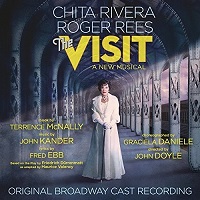 Original Broadway Cast, 2015 (Broadway Records)
Original Broadway Cast, 2015 (Broadway Records)  (4 / 5) The Visit is an extraordinary late-career work by composer John Kander and lyricist Fred Ebb, who enriched the American musical theater with multiple scores of excellent quality over a 40-year period. In partnership with book writer Terrence McNally, their previous collaborator for The Rink and Kiss of the Spider Woman, Kander & Ebb crafted a flawed but compelling adaptation of Friedrich Dürrenmatt’s play about Claire Zachanassian, a fabulously wealthy old woman who returns to the town where she grew up and offers to save it from financial ruin if the citizens will be the agents of her ultimate revenge against Anton Schill, her former lover, who wronged her terribly when they were both in their youth. Shocking, moving, and bitterly funny by turns, this story has been musicalized skillfully, for the most part, in songs that run the gamut from the darkly comic “I Walk Away” to the gorgeous love ballad “You, You, You” to the creepy “I Will Never Leave You” to the hauntingly wistful “Love and Love Alone.” One of the most astonishing facets of the show is the production number “Yellow Shoes,” in which the townspeople rejoice over material goods purchased with credit they have been granted in anticipation of the windfall they expect in return for murdering Schill. Following runs in Chicago and at the Signature Theatre in the Washington, D.C. metro area, a shortened version of The Visit was presented as part of the Williamstown Theater Festival in 2014 and then came to New York the following year in a production poorly directed by John Doyle. The Broadway run amounted to only 61 performances, but that tally should not dissuade one from experiencing the cast album, which showcases the stellar performance of beloved Broadway veteran Chita Rivera as Claire. Captivating as always, Rivera is partnered by the Anton of Roger Rees, who recorded this album while suffering from the brain cancer that forced him to bow out of The Visit during its short Broadway run. (In retrospect, his passing in July 2015, as well as the deaths of Fred Ebb in 2004 and Terrence McNally in 2020, amplify and deepen the elegiac feel of the recording.) Among the other standouts in the cast are Jason Danieley as the schoolmaster who represents the conscience of the town in “The Only One”; Tom Nelis, Matthew Deming, and Chris Newcomer as Claire’s “entourage,” two of them eunuchs who sing in falsetto; and, in the role of Young Anton, John Riddle, whose beautiful tenor is a pleasure to hear in “You, You, You.” With a score that also contains a few songs less effective than those mentioned above, The Visit is not so finely honed a musical as the very best of the best, such as Kander & Ebb’s Cabaret and Chicago, but it’s a worthy addition to the canon. — Michael Portantiere
(4 / 5) The Visit is an extraordinary late-career work by composer John Kander and lyricist Fred Ebb, who enriched the American musical theater with multiple scores of excellent quality over a 40-year period. In partnership with book writer Terrence McNally, their previous collaborator for The Rink and Kiss of the Spider Woman, Kander & Ebb crafted a flawed but compelling adaptation of Friedrich Dürrenmatt’s play about Claire Zachanassian, a fabulously wealthy old woman who returns to the town where she grew up and offers to save it from financial ruin if the citizens will be the agents of her ultimate revenge against Anton Schill, her former lover, who wronged her terribly when they were both in their youth. Shocking, moving, and bitterly funny by turns, this story has been musicalized skillfully, for the most part, in songs that run the gamut from the darkly comic “I Walk Away” to the gorgeous love ballad “You, You, You” to the creepy “I Will Never Leave You” to the hauntingly wistful “Love and Love Alone.” One of the most astonishing facets of the show is the production number “Yellow Shoes,” in which the townspeople rejoice over material goods purchased with credit they have been granted in anticipation of the windfall they expect in return for murdering Schill. Following runs in Chicago and at the Signature Theatre in the Washington, D.C. metro area, a shortened version of The Visit was presented as part of the Williamstown Theater Festival in 2014 and then came to New York the following year in a production poorly directed by John Doyle. The Broadway run amounted to only 61 performances, but that tally should not dissuade one from experiencing the cast album, which showcases the stellar performance of beloved Broadway veteran Chita Rivera as Claire. Captivating as always, Rivera is partnered by the Anton of Roger Rees, who recorded this album while suffering from the brain cancer that forced him to bow out of The Visit during its short Broadway run. (In retrospect, his passing in July 2015, as well as the deaths of Fred Ebb in 2004 and Terrence McNally in 2020, amplify and deepen the elegiac feel of the recording.) Among the other standouts in the cast are Jason Danieley as the schoolmaster who represents the conscience of the town in “The Only One”; Tom Nelis, Matthew Deming, and Chris Newcomer as Claire’s “entourage,” two of them eunuchs who sing in falsetto; and, in the role of Young Anton, John Riddle, whose beautiful tenor is a pleasure to hear in “You, You, You.” With a score that also contains a few songs less effective than those mentioned above, The Visit is not so finely honed a musical as the very best of the best, such as Kander & Ebb’s Cabaret and Chicago, but it’s a worthy addition to the canon. — Michael Portantiere
All posts by Michael Portantiere
Paramour
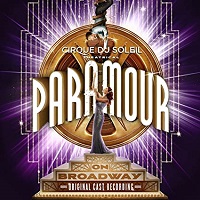 Original Broadway Cast, 2016 (Cirque du Soleil)
Original Broadway Cast, 2016 (Cirque du Soleil)  (2 / 5) With its spectacular entertainments showcasing nouveau-circus acts of all types, accessorized with top-drawer production values and very listenable if somewhat bland music, Cirque du Soleil has experienced great success over the decades since the company’s birth in Quebec in 1984. But Cirque did not have a hit with its 2016 attempt to create a Broadway musical incorporating the sort of acts (aerialists, acrobats, etc.) and accoutrements for which it has become world famous. The show was called Paramour, or rather, Cirque du Soleil Paramour, and simply reading the credits is enough to give one pause. Believe it or not, no book writer is listed, with West Hyler acknowledged only for the “story” and as “scene director.” (So, who wrote the dialogue?) As for the score credits, here you go: music by Bob & Bill (????), co-composer Andreas Carlsson, assistant composer Martin Laniel, lyrics by Andreas Carlsson, additional lyrics by Jenny Stafford. The resulting mess of a show purported to tell a tale of “The Golden Age of Hollywood,” though there were countless anachronisms in the dialogue and only intermittent nods toward period authenticity in the score and the design elements. The plot, such as it is, has the megalomaniacal film director A.J. (Jeremy Kushnier) discovering a potential new movie star in nightclub chanteuse Indigo (Ruby Davis), leading to lots of clichéd goings-on while the audience waits to see if our heroine will eventually end up with her pianist/songwriter, Joey (Ryan Vona), the nice guy who adores her. Given this show’s pedigree and the fact that Cirque did not feel it necessary to hire anyone with traditional musical theater talent or experience to put it together, the cast album is more pleasing if you approach it as a collection of pop songs rather than a recording of a score written to serve a cohesive and compelling narrative, which is certainly not what we have here. From that perspective, three of the most enjoyable items are “A.J.’s Blues” and “The Muse,” both performed for all their worth by Broadway veteran Kushnier; and “Something More,” a pretty ballad persuasively rendered by Davis in her Broadway debut. On the minus side, “Everything (The Lover’s Theme)” and the opening number, “The Hollywood Wiz,” are far too generic to make any significant effect. The same might be said for the bulk of the score. — Michael Portantiere
(2 / 5) With its spectacular entertainments showcasing nouveau-circus acts of all types, accessorized with top-drawer production values and very listenable if somewhat bland music, Cirque du Soleil has experienced great success over the decades since the company’s birth in Quebec in 1984. But Cirque did not have a hit with its 2016 attempt to create a Broadway musical incorporating the sort of acts (aerialists, acrobats, etc.) and accoutrements for which it has become world famous. The show was called Paramour, or rather, Cirque du Soleil Paramour, and simply reading the credits is enough to give one pause. Believe it or not, no book writer is listed, with West Hyler acknowledged only for the “story” and as “scene director.” (So, who wrote the dialogue?) As for the score credits, here you go: music by Bob & Bill (????), co-composer Andreas Carlsson, assistant composer Martin Laniel, lyrics by Andreas Carlsson, additional lyrics by Jenny Stafford. The resulting mess of a show purported to tell a tale of “The Golden Age of Hollywood,” though there were countless anachronisms in the dialogue and only intermittent nods toward period authenticity in the score and the design elements. The plot, such as it is, has the megalomaniacal film director A.J. (Jeremy Kushnier) discovering a potential new movie star in nightclub chanteuse Indigo (Ruby Davis), leading to lots of clichéd goings-on while the audience waits to see if our heroine will eventually end up with her pianist/songwriter, Joey (Ryan Vona), the nice guy who adores her. Given this show’s pedigree and the fact that Cirque did not feel it necessary to hire anyone with traditional musical theater talent or experience to put it together, the cast album is more pleasing if you approach it as a collection of pop songs rather than a recording of a score written to serve a cohesive and compelling narrative, which is certainly not what we have here. From that perspective, three of the most enjoyable items are “A.J.’s Blues” and “The Muse,” both performed for all their worth by Broadway veteran Kushnier; and “Something More,” a pretty ballad persuasively rendered by Davis in her Broadway debut. On the minus side, “Everything (The Lover’s Theme)” and the opening number, “The Hollywood Wiz,” are far too generic to make any significant effect. The same might be said for the bulk of the score. — Michael Portantiere
Passing Strange
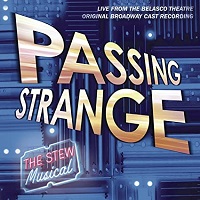 Original Broadway Cast, 2008 (Ghostlight)
Original Broadway Cast, 2008 (Ghostlight)  (4 / 5) Passing Strange is the semi-autobiographical work of singer/songwriter Stew, co-written with his longtime collaborator Heidi Rodewald. The story follows Youth, a young black man played by an explosive Daniel Breaker. Anxious to be an artist and eager to search for what’s real in the world, Youth leaves behind his life of comfort in a California suburb for the exoticism of Europe. In doing so, he ends up cutting ties with everyone in his life — including his loving if not completely understanding mother, a role sung with warmth by Eisa Davis. On stage, Passing Strange was a highly energetic experience for audiences, but also a divisive one. This cast album, recorded live at the Belasco Theatre where the show played, will most likely prove divisive as well. First time listeners may be confused: There is very little dialogue between songs, leaving major gaps in the plot, and the method of the storytelling constantly changes so that characters either sing to each other, about each other, or from the point of view of the Narrator (played by Stew), often within the same song. However, to dismiss Passing Strange because of its non-traditional structure and its difficulty to categorize would be to ignore everything else that the show and this album have to offer. Stew and Rodewald’s music, which they also orchestrated, pulsates with creativity and spirit, whether permeating the air with soothing, lilting ballads such as“Keys (Marianna)” and “Come Down Now” or working up a sweat in “Keys (It’s Alright)” and “Mom Song.” As for Stew’s lyrics, they are artfully crafted while also conveying real emotion and conflict. Before the Broadway production of Passing Strange closed, Spike Lee filmed it; that film can be sought out by anyone who would like a more comprehensive understanding of the piece, and it also allows a greater appreciation of the work of the phenomenal cast. But even on stage, Passing Strange was less concerned with the details of its story than with the emotional potency of its journey. Perhaps if neophytes approached the recording as more of a pop/rock concept album, like Tommy or Jesus Christ Superstar, they’d have a clearer idea of what to expect from this highly creative work. — Matt Koplik
(4 / 5) Passing Strange is the semi-autobiographical work of singer/songwriter Stew, co-written with his longtime collaborator Heidi Rodewald. The story follows Youth, a young black man played by an explosive Daniel Breaker. Anxious to be an artist and eager to search for what’s real in the world, Youth leaves behind his life of comfort in a California suburb for the exoticism of Europe. In doing so, he ends up cutting ties with everyone in his life — including his loving if not completely understanding mother, a role sung with warmth by Eisa Davis. On stage, Passing Strange was a highly energetic experience for audiences, but also a divisive one. This cast album, recorded live at the Belasco Theatre where the show played, will most likely prove divisive as well. First time listeners may be confused: There is very little dialogue between songs, leaving major gaps in the plot, and the method of the storytelling constantly changes so that characters either sing to each other, about each other, or from the point of view of the Narrator (played by Stew), often within the same song. However, to dismiss Passing Strange because of its non-traditional structure and its difficulty to categorize would be to ignore everything else that the show and this album have to offer. Stew and Rodewald’s music, which they also orchestrated, pulsates with creativity and spirit, whether permeating the air with soothing, lilting ballads such as“Keys (Marianna)” and “Come Down Now” or working up a sweat in “Keys (It’s Alright)” and “Mom Song.” As for Stew’s lyrics, they are artfully crafted while also conveying real emotion and conflict. Before the Broadway production of Passing Strange closed, Spike Lee filmed it; that film can be sought out by anyone who would like a more comprehensive understanding of the piece, and it also allows a greater appreciation of the work of the phenomenal cast. But even on stage, Passing Strange was less concerned with the details of its story than with the emotional potency of its journey. Perhaps if neophytes approached the recording as more of a pop/rock concept album, like Tommy or Jesus Christ Superstar, they’d have a clearer idea of what to expect from this highly creative work. — Matt Koplik
Emojiland
 Original Off-Broadway Cast, 2020 (Broadway Records)
Original Off-Broadway Cast, 2020 (Broadway Records)  (2 / 5) This recording represents the Off-Broadway production of Emojiland, a knowingly campy musical that proudly planted its digital freak flag on the theatrical landscape. In an era when even many Off-Broadway ventures are crafted for mainstream appeal, usually in the hope of receiving a transfer to Broadway, it’s somewhat refreshing to listen to this cast album of a show that has no objective other than to entertain through humor and absurdity. How successful it is at doing so is another matter. Written by Laura Schein and Keith Harrison, the musical takes its title from the ideograms that have become so popular in the age of communication through digital devices. The story explores a world populated by these emojis — including such favorites as Kissy Face and Pile of Poo — as they grapple with the disruption of their society that has resulted from the latest software update. Though the show’s plot touches on major themes like xenophobia and prejudice, Emojiland has no intention of being any meatier than a bag of gummy bears. Schein and Harrison’s upbeat score appropriately leans towards techno-pop, and if their lyrics aren’t laugh-out-loud funny, they’re contentedly witty and keep the fun going. Emojiland also benefits from a cast that appears game for the ridiculousness of the piece, led by Schein herself as ingénue Smize. Lesli Margherita and Josh Lamon, in particular, give ingenious comedic turns as the emojis Princeess and Prince, respectively. Like any sugar rush, the show starts to wear itself out rather quickly, and once Lamon and Margherita finish letting loose with the Act 2 opener “Firewall Ball,” the album becomes something of a chore to finish. But even if it doesn’t stay with you for long, Emojiland offers lots of fun in the moment. — Matt Koplik
(2 / 5) This recording represents the Off-Broadway production of Emojiland, a knowingly campy musical that proudly planted its digital freak flag on the theatrical landscape. In an era when even many Off-Broadway ventures are crafted for mainstream appeal, usually in the hope of receiving a transfer to Broadway, it’s somewhat refreshing to listen to this cast album of a show that has no objective other than to entertain through humor and absurdity. How successful it is at doing so is another matter. Written by Laura Schein and Keith Harrison, the musical takes its title from the ideograms that have become so popular in the age of communication through digital devices. The story explores a world populated by these emojis — including such favorites as Kissy Face and Pile of Poo — as they grapple with the disruption of their society that has resulted from the latest software update. Though the show’s plot touches on major themes like xenophobia and prejudice, Emojiland has no intention of being any meatier than a bag of gummy bears. Schein and Harrison’s upbeat score appropriately leans towards techno-pop, and if their lyrics aren’t laugh-out-loud funny, they’re contentedly witty and keep the fun going. Emojiland also benefits from a cast that appears game for the ridiculousness of the piece, led by Schein herself as ingénue Smize. Lesli Margherita and Josh Lamon, in particular, give ingenious comedic turns as the emojis Princeess and Prince, respectively. Like any sugar rush, the show starts to wear itself out rather quickly, and once Lamon and Margherita finish letting loose with the Act 2 opener “Firewall Ball,” the album becomes something of a chore to finish. But even if it doesn’t stay with you for long, Emojiland offers lots of fun in the moment. — Matt Koplik
Broadway Bounty Hunter
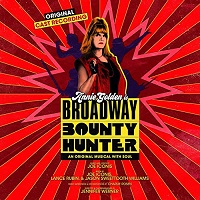 Original Off-Broadway Cast, 2020 (Ghostlight)
Original Off-Broadway Cast, 2020 (Ghostlight)  (4 / 5) Here’s a highly enjoyable cast album of a fun show with a fanciful, meta-theatrical concept, built around the dynamic singer-actress Annie Golden, who started out as the leader of the punk band The Shirts before going on to play Jeannie in the film version of Hair, then to numerous other film, TV, and stage roles. In Broadway Bounty Hunter, Golden played a highly fictionalized version of herself caught up in a crazy plot involving — well, bounty hunting. The show was (obviously) crafted specifically for her by the super-talented composer-lyricist Joe Iconis, working in collaboration with co-book writers Lance Rubin and Jason Sweettooth Williams. It would have been interesting to see if Broadway Bounty Hunter would have worked with other performers as replacements in the title role, but the show had a very limited Off-Broadway run, and there was no transfer to an open-ended engagement on Broadway or anywhere else. So it’s nice to have Iconis’s clever, tuneful, post-modern theatrical rock and pop songs preserved on this well produced cast album. Golden’s strong, exciting voice and her abundance of charisma come through big-time in a clutch of songs, from the roof-raising “Woman of a Certain Age” (wisely used as both the show’s opener and closer) to the soulful “Spin Those Records” and the intense, hard-rocking 11 o’clock number “Veins.” Other major voices and personalities heard on the album include Badia Farha, Alan H. Green, Christina Sajous, Emily Borromeo, and the always welcome Brad Oscar. A kick-ass band is led by conductor/musical director Geoffrey Ko, and Joel Waggoner’s vocal arrangements are excellent. Given the lack of commercial success of both Broadway Bounty Hunter and Iconis’s Be More Chill, at least in their NYC runs, it’s devoutly to be wished that he’ll soon have the major hit he deserves. — Michael Portantiere
(4 / 5) Here’s a highly enjoyable cast album of a fun show with a fanciful, meta-theatrical concept, built around the dynamic singer-actress Annie Golden, who started out as the leader of the punk band The Shirts before going on to play Jeannie in the film version of Hair, then to numerous other film, TV, and stage roles. In Broadway Bounty Hunter, Golden played a highly fictionalized version of herself caught up in a crazy plot involving — well, bounty hunting. The show was (obviously) crafted specifically for her by the super-talented composer-lyricist Joe Iconis, working in collaboration with co-book writers Lance Rubin and Jason Sweettooth Williams. It would have been interesting to see if Broadway Bounty Hunter would have worked with other performers as replacements in the title role, but the show had a very limited Off-Broadway run, and there was no transfer to an open-ended engagement on Broadway or anywhere else. So it’s nice to have Iconis’s clever, tuneful, post-modern theatrical rock and pop songs preserved on this well produced cast album. Golden’s strong, exciting voice and her abundance of charisma come through big-time in a clutch of songs, from the roof-raising “Woman of a Certain Age” (wisely used as both the show’s opener and closer) to the soulful “Spin Those Records” and the intense, hard-rocking 11 o’clock number “Veins.” Other major voices and personalities heard on the album include Badia Farha, Alan H. Green, Christina Sajous, Emily Borromeo, and the always welcome Brad Oscar. A kick-ass band is led by conductor/musical director Geoffrey Ko, and Joel Waggoner’s vocal arrangements are excellent. Given the lack of commercial success of both Broadway Bounty Hunter and Iconis’s Be More Chill, at least in their NYC runs, it’s devoutly to be wished that he’ll soon have the major hit he deserves. — Michael Portantiere
Be More Chill
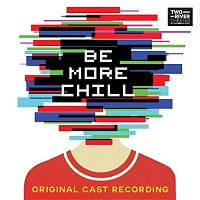 Original Cast, Two River Theater, 2015 (Ghostlight)
Original Cast, Two River Theater, 2015 (Ghostlight)  (4 / 5) Based on a novel by Ned Vizzini, Be More Chill is a cautionary tale about a loner teenager named Jeremy Heere who attempts to become “chill” by ingesting something called a “squip” (super quantum unit Intel processor), which winds up controlling his thoughts and actions. The show premiered at the Two River Theater in Red Bank, New Jersey for a one-month limited run in 2015. That production received mixed reviews, but this cast recording gained huge popularity via internet streaming and downloads, eventually sparking the Off-Broadway production of 2018 and the subsequent Broadway transfer (see below). Even if it’s hard to explain exactly how the score “went viral,” it’s easy to understand why it did: Composer-lyricist Joe Iconis has a firm grounding in the classic musical theater canon, and a great talent for being able to wed traditional song structures and other methods of craft with an up-to-the-minute sound and sensibility. Listen to the opener, “More Than Survive,” a spot-on, character-establishing, “I want” song for Jeremy that begins as follows: “C-c-c-come on, c-c-c- come on! Go, go! I’m waiting for my porn to download.” (The album has an “explicit lyrics” label.) Or sample “The Smartphone Hour (Rich Set a Fire),” a super-clever takeoff on “The Telephone Hour” from Bye Bye Birdie. Also quite amusing is Iconis’s depiction of present-day high school theater subculture, as in “I Love Play Rehearsal.” The pretty much ideal cast heard here is led by Will Connolly as a charmingly nerdy Jeremy, with Eric William Morris as The Squip; George Salazar as Jeremy’s staunch friend, Michael; Stephanie Hsu as Christine, the girl with whom Jeremy’s obsessed; and Gerard Canonico in a ball-of-fire performance as Rich, the ill-fated guy who turns Jeremy on to The Squip. Salazar does a tour-de-force job with arguably the best song in the score, the one that became the biggest viral phenomenon of all: “Michael in the Bathroom,” an affecting expression of teen angst. — Michael Portantiere
(4 / 5) Based on a novel by Ned Vizzini, Be More Chill is a cautionary tale about a loner teenager named Jeremy Heere who attempts to become “chill” by ingesting something called a “squip” (super quantum unit Intel processor), which winds up controlling his thoughts and actions. The show premiered at the Two River Theater in Red Bank, New Jersey for a one-month limited run in 2015. That production received mixed reviews, but this cast recording gained huge popularity via internet streaming and downloads, eventually sparking the Off-Broadway production of 2018 and the subsequent Broadway transfer (see below). Even if it’s hard to explain exactly how the score “went viral,” it’s easy to understand why it did: Composer-lyricist Joe Iconis has a firm grounding in the classic musical theater canon, and a great talent for being able to wed traditional song structures and other methods of craft with an up-to-the-minute sound and sensibility. Listen to the opener, “More Than Survive,” a spot-on, character-establishing, “I want” song for Jeremy that begins as follows: “C-c-c-come on, c-c-c- come on! Go, go! I’m waiting for my porn to download.” (The album has an “explicit lyrics” label.) Or sample “The Smartphone Hour (Rich Set a Fire),” a super-clever takeoff on “The Telephone Hour” from Bye Bye Birdie. Also quite amusing is Iconis’s depiction of present-day high school theater subculture, as in “I Love Play Rehearsal.” The pretty much ideal cast heard here is led by Will Connolly as a charmingly nerdy Jeremy, with Eric William Morris as The Squip; George Salazar as Jeremy’s staunch friend, Michael; Stephanie Hsu as Christine, the girl with whom Jeremy’s obsessed; and Gerard Canonico in a ball-of-fire performance as Rich, the ill-fated guy who turns Jeremy on to The Squip. Salazar does a tour-de-force job with arguably the best song in the score, the one that became the biggest viral phenomenon of all: “Michael in the Bathroom,” an affecting expression of teen angst. — Michael Portantiere
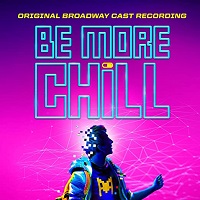 Original Broadway Cast, 2019 (Ghostlight, 2CDs)
Original Broadway Cast, 2019 (Ghostlight, 2CDs)  (4 / 5) Buoyed by the extraordinary online popularity of its score, as described above, Be More Chill was presented Off-Broadway at the Irene Diamond Stage at the Pershing Square Signature Center in the summer of 2018, with plans for a move to Broadway already largely in place at that time. This production featured several cast members from the Two River Theater production mentioned above, including Stephanie Hsu, George Salazar, and Gerard Canonico reprising the roles they originated. New cast members included Will Roland as Jeremy, Jason Tam as the Squip, Tiffany Mann as Jenna, Britton Smith as Jake, and Jason “Sweettooth” Williams as Mr. Heere, but not all of these changes were improvements; for example, Roland’s performance doesn’t have quite the likeability of Connolly’s, and Smith is miscast. On the plus side, Tam makes the role of The Squip very much his own with his strong, distinctive voice and his very funny Keanu Reeves imitation. The score is well performed as heard here, with some relatively minor rewrites and additions to the material. (This album is longer than the original, 24 tracks as compared to 21.) Both the Off-Broadway and Broadway productions of Be More Chill were marred by painfully loud sound amplification, which may have been partly responsible for the brief 2019 Broadway run (only 177 performances) of a show that many had expected to be a big hit, so the fact that listeners to the cast album can control the volume is a huge plus for the experience. Music and lyrics this good don’t need to be blasted at an audience; on the contrary, any score suffers greatly rather than benefits from such treatment, a lesson that Iconis and his colleagues will hopefully learn for future productions of his shows. — M.P.
(4 / 5) Buoyed by the extraordinary online popularity of its score, as described above, Be More Chill was presented Off-Broadway at the Irene Diamond Stage at the Pershing Square Signature Center in the summer of 2018, with plans for a move to Broadway already largely in place at that time. This production featured several cast members from the Two River Theater production mentioned above, including Stephanie Hsu, George Salazar, and Gerard Canonico reprising the roles they originated. New cast members included Will Roland as Jeremy, Jason Tam as the Squip, Tiffany Mann as Jenna, Britton Smith as Jake, and Jason “Sweettooth” Williams as Mr. Heere, but not all of these changes were improvements; for example, Roland’s performance doesn’t have quite the likeability of Connolly’s, and Smith is miscast. On the plus side, Tam makes the role of The Squip very much his own with his strong, distinctive voice and his very funny Keanu Reeves imitation. The score is well performed as heard here, with some relatively minor rewrites and additions to the material. (This album is longer than the original, 24 tracks as compared to 21.) Both the Off-Broadway and Broadway productions of Be More Chill were marred by painfully loud sound amplification, which may have been partly responsible for the brief 2019 Broadway run (only 177 performances) of a show that many had expected to be a big hit, so the fact that listeners to the cast album can control the volume is a huge plus for the experience. Music and lyrics this good don’t need to be blasted at an audience; on the contrary, any score suffers greatly rather than benefits from such treatment, a lesson that Iconis and his colleagues will hopefully learn for future productions of his shows. — M.P.
Sing Street
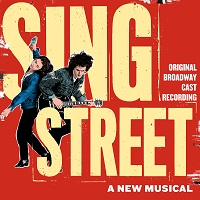 Original Broadway Cast, 2019 (Sony Masterworks Broadway)
Original Broadway Cast, 2019 (Sony Masterworks Broadway)  (4 / 5) First, a few words of explanation: The show that yielded this cast album opened Off-Broadway at the New York Theatre Workshop in December 2019. It was announced for a Broadway transfer even before the NYTW run ended — but then the COVID-19 crisis that began in the spring of 2020 scuttled those plans, indefinitely closing all theaters in New York City (and pretty much throughout the world). So even though this album literally has “Broadway” written all over it, we have no way of knowing at this writing if Sing Street will ever make it to The Street. At any rate, the show has a wonderfully infectious score, here preserved as one of the most compulsively listenable cast recordings in recent memory; and since all of the performers heard on the album were officially cast in the Broadway transfer of the show, the “Original Broadway Cast” designation is arguably not inaccurate. Based on a 2016 coming-of-age film set in Dublin in 1982, the musical features a generous handful of terrific songs that were originally written by Gary Clark and John Carney for that sweet indie flick, plus some new material. The opening track, “Just Can’t Get Enough,” gives us a happy hint that we’re going to be hearing lots of catchy up-tunes crafted in ’80s-rock style, with irresistible hooks. That certainly turns out to be true, as with such other cuts as “Drive It Like You Stole It,” “Brown Shoes,” “A Beautiful Sea,” and “Girls,” but there are also some lovely ballads (“Dream for You,” “Go Now”). Brenock O’Connor, in the central role of schoolboy/aspiring rock star Conor Lawlor, does a fine, authentic-sounding job with much of the solo singing on the album, and there are also worthy contributions from Zara Devlin as Raphina, a young model on whom Conor develops a major crush; Martin Moran as the authoritarian Brother Baxter; and Gus Halper as Conor’s troubled brother, Brendan (he does a beautiful job with “Go Now”). One of the best songs in the score, “Up,” is heard in two different versions — ballad and up-tempo, both highly enjoyable. At the end of the show, Conor leaves his family and his band to go with Raphina off to London, where they will seek their fortunes. Here’s hoping that the future will be bright for them and for this charming, affecting, lovable little musical. — M.P.
(4 / 5) First, a few words of explanation: The show that yielded this cast album opened Off-Broadway at the New York Theatre Workshop in December 2019. It was announced for a Broadway transfer even before the NYTW run ended — but then the COVID-19 crisis that began in the spring of 2020 scuttled those plans, indefinitely closing all theaters in New York City (and pretty much throughout the world). So even though this album literally has “Broadway” written all over it, we have no way of knowing at this writing if Sing Street will ever make it to The Street. At any rate, the show has a wonderfully infectious score, here preserved as one of the most compulsively listenable cast recordings in recent memory; and since all of the performers heard on the album were officially cast in the Broadway transfer of the show, the “Original Broadway Cast” designation is arguably not inaccurate. Based on a 2016 coming-of-age film set in Dublin in 1982, the musical features a generous handful of terrific songs that were originally written by Gary Clark and John Carney for that sweet indie flick, plus some new material. The opening track, “Just Can’t Get Enough,” gives us a happy hint that we’re going to be hearing lots of catchy up-tunes crafted in ’80s-rock style, with irresistible hooks. That certainly turns out to be true, as with such other cuts as “Drive It Like You Stole It,” “Brown Shoes,” “A Beautiful Sea,” and “Girls,” but there are also some lovely ballads (“Dream for You,” “Go Now”). Brenock O’Connor, in the central role of schoolboy/aspiring rock star Conor Lawlor, does a fine, authentic-sounding job with much of the solo singing on the album, and there are also worthy contributions from Zara Devlin as Raphina, a young model on whom Conor develops a major crush; Martin Moran as the authoritarian Brother Baxter; and Gus Halper as Conor’s troubled brother, Brendan (he does a beautiful job with “Go Now”). One of the best songs in the score, “Up,” is heard in two different versions — ballad and up-tempo, both highly enjoyable. At the end of the show, Conor leaves his family and his band to go with Raphina off to London, where they will seek their fortunes. Here’s hoping that the future will be bright for them and for this charming, affecting, lovable little musical. — M.P.
Anything Can Happen in the Theater: The Musical World of Maury Yeston
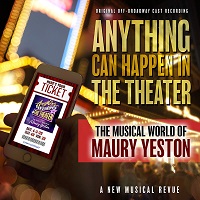 Original Off-Broadway Cast, 2019 (PS Classics)
Original Off-Broadway Cast, 2019 (PS Classics)  (4 / 5) Maury Yeston is one of the finest and most versatile musical theater composer-lyricists of his era, so it’s good to have this cast album of a very enjoyable and well-crafted revue of his work that was presented Off-Broadway by the York Theatre Company in 2019, directed by Gerard Alessandrini of Forbidden Broadway fame. The program includes songs from Yeston’s most famous shows, with one major exception (see below), along with a healthy sampling of less-well-known material. From Nine, we have the bravura number “Guido’s Song” and the lyrical “Only With You,” both rendered with lovely tenor tone by Benjamin Eakeley, as well as the gorgeous “Unusual Way” and the wittily seductive “A Call From the Vatican,” two fine showcases for the talents of Mamie Parris. Also to be found here is “Cinema Italiano,” written by Yeston expressly for the film version of Nine, performed with verve by Parris, Justin Keyes, and Jovan E’Sean. Two selections from Grand Hotel, for which Yeston contributed much but not all of the score (to augment songs previously written by Wright and Forrest for an earlier incarnation of the show), are the passionate “Love Can’t Happen” (Eakeley) and the delightful “I Want to Go to Hollywood” (Parris). Yeston’s Phantom, a lesser-known alternative to Andrew Lloyd Webber’s adaptation of the same source material, is represented by “Home,” sung by the full company. “New Words,” from a Biblical musical titled In the Beginning , is a touching song, movingly performed here by Eakeley, about a parent teaching language to a young child; the writing is marred only by a surprising error in the lyrics. (Mars is a planet, Mr Y., not a star!) This recording also embraces several stand-alone songs, i.e., not from the scores of musicals. Two of the best of these are “Danglin’,” a soulful torcher eased on down by Alex Getlin, and the specially written title tune of the revue, delivered by all as the opening number. An exceptionally noteworthy item is the sexy/funny “Salt n Pepper,” originally written for the unproduced musical The Queen of Basin Street, here given a spicy turn by E’Sean. Not sampled is the score of one of Yeston’s biggest hits, Titanic; although an exquisitely harmonized arrangement of that title song was featured as an encore in the York production, it’s not on the album, for some reason. Conversely, one thing the recording boasts that the show itself did not are Doug Besterman’s excellent orchestrations for eight musicians variously playing a total of about 20 instruments. Greg Jarrett is the top-notch musical director — Michael Portantiere
(4 / 5) Maury Yeston is one of the finest and most versatile musical theater composer-lyricists of his era, so it’s good to have this cast album of a very enjoyable and well-crafted revue of his work that was presented Off-Broadway by the York Theatre Company in 2019, directed by Gerard Alessandrini of Forbidden Broadway fame. The program includes songs from Yeston’s most famous shows, with one major exception (see below), along with a healthy sampling of less-well-known material. From Nine, we have the bravura number “Guido’s Song” and the lyrical “Only With You,” both rendered with lovely tenor tone by Benjamin Eakeley, as well as the gorgeous “Unusual Way” and the wittily seductive “A Call From the Vatican,” two fine showcases for the talents of Mamie Parris. Also to be found here is “Cinema Italiano,” written by Yeston expressly for the film version of Nine, performed with verve by Parris, Justin Keyes, and Jovan E’Sean. Two selections from Grand Hotel, for which Yeston contributed much but not all of the score (to augment songs previously written by Wright and Forrest for an earlier incarnation of the show), are the passionate “Love Can’t Happen” (Eakeley) and the delightful “I Want to Go to Hollywood” (Parris). Yeston’s Phantom, a lesser-known alternative to Andrew Lloyd Webber’s adaptation of the same source material, is represented by “Home,” sung by the full company. “New Words,” from a Biblical musical titled In the Beginning , is a touching song, movingly performed here by Eakeley, about a parent teaching language to a young child; the writing is marred only by a surprising error in the lyrics. (Mars is a planet, Mr Y., not a star!) This recording also embraces several stand-alone songs, i.e., not from the scores of musicals. Two of the best of these are “Danglin’,” a soulful torcher eased on down by Alex Getlin, and the specially written title tune of the revue, delivered by all as the opening number. An exceptionally noteworthy item is the sexy/funny “Salt n Pepper,” originally written for the unproduced musical The Queen of Basin Street, here given a spicy turn by E’Sean. Not sampled is the score of one of Yeston’s biggest hits, Titanic; although an exquisitely harmonized arrangement of that title song was featured as an encore in the York production, it’s not on the album, for some reason. Conversely, one thing the recording boasts that the show itself did not are Doug Besterman’s excellent orchestrations for eight musicians variously playing a total of about 20 instruments. Greg Jarrett is the top-notch musical director — Michael Portantiere
Mary Poppins
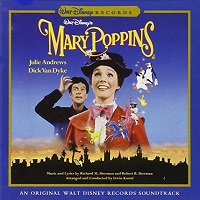 Film Soundtrack, 1964 (Buena Vista/Walt Disney Records)
Film Soundtrack, 1964 (Buena Vista/Walt Disney Records)  (5 / 5) Disney’s Mary Poppins has been beloved from the moment audiences first saw the film in 1964, permeating our culture and becoming a hallmark for family friendly entertainment. Even if you’re a neophyte to the story of the mysterious and magical nanny who teaches a British family the importance of love, fun, and compassion, you’ll understand why the film has attained classic status with just one listen to this soundtrack. The score, by brothers Richard M. and Robert B. Sherman, remains timeless, with many of the songs long ago having achieved the status of internationally recognized standards: “A Spoonful of Sugar,” “ Jolly Holiday,” “Supercalifragilisticxpialidocious,” et al. Indeed, it’s difficult to think of another original movie musical that has produced as many great songs — and even the lesser-known ones, such as “Sister Suffragette” and “The Perfect Nanny,” are clever and charming enough to avoid being the sort of “skippable” tracks that even some of the best Broadway cast albums contain. As the action of the film is set in London in the early 1900s, Irwin Kostal’s arrangements pay fitting homage to Edwardian music halls, and his incidental music (included on deluxe editions of the soundtrack) craftily rearranges the Sherman Brothers’ compositions to feel like new pieces. As for the cast, they remain unbeatable. Julie Andrews made one of the most smashing screen debuts in history as Mary Poppins, a role that showcases her immense range, from comedic vaudevillian (“Supercalifragilisticxpialidocious”) to intimate chanteuse (“Feed the Birds”). By her side is Dick Van Dyke, effervescent as Bert, a jack-of-all-trades and loyal friend to Mary and her charges, Jane and Michael Banks. Though Van Dyke’s Cockney accent is legendarily awful, it really doesn’t matter at this point, as its humorous inauthenticity has taken on its own charming, nostalgic quality. In short, this soundtrack is a perfect companion to the landmark film. — Matt Koplik
(5 / 5) Disney’s Mary Poppins has been beloved from the moment audiences first saw the film in 1964, permeating our culture and becoming a hallmark for family friendly entertainment. Even if you’re a neophyte to the story of the mysterious and magical nanny who teaches a British family the importance of love, fun, and compassion, you’ll understand why the film has attained classic status with just one listen to this soundtrack. The score, by brothers Richard M. and Robert B. Sherman, remains timeless, with many of the songs long ago having achieved the status of internationally recognized standards: “A Spoonful of Sugar,” “ Jolly Holiday,” “Supercalifragilisticxpialidocious,” et al. Indeed, it’s difficult to think of another original movie musical that has produced as many great songs — and even the lesser-known ones, such as “Sister Suffragette” and “The Perfect Nanny,” are clever and charming enough to avoid being the sort of “skippable” tracks that even some of the best Broadway cast albums contain. As the action of the film is set in London in the early 1900s, Irwin Kostal’s arrangements pay fitting homage to Edwardian music halls, and his incidental music (included on deluxe editions of the soundtrack) craftily rearranges the Sherman Brothers’ compositions to feel like new pieces. As for the cast, they remain unbeatable. Julie Andrews made one of the most smashing screen debuts in history as Mary Poppins, a role that showcases her immense range, from comedic vaudevillian (“Supercalifragilisticxpialidocious”) to intimate chanteuse (“Feed the Birds”). By her side is Dick Van Dyke, effervescent as Bert, a jack-of-all-trades and loyal friend to Mary and her charges, Jane and Michael Banks. Though Van Dyke’s Cockney accent is legendarily awful, it really doesn’t matter at this point, as its humorous inauthenticity has taken on its own charming, nostalgic quality. In short, this soundtrack is a perfect companion to the landmark film. — Matt Koplik
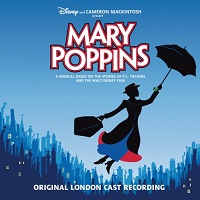 Original London Cast, 2005 (Walt Disney Records)
Original London Cast, 2005 (Walt Disney Records)  (4 / 5) Although Disney’s Mary Poppins is a beloved classic, author P.L. Travers, who wrote the book series on which the film was based, famously hated it. For this reason, Travers initially refused any further adaptations of her stories about the magical nanny while she was alive — that is, until producer Cameron Mackintosh persuaded her to grant him the rights to create a stage musical. Travers acquiesced on the condition that the entire creative team for the project would be British and would exclude everyone involved in the Disney movie. Mackintosh kept his word, to a certain extent: Although he collaborated with Disney Theatrical Productions so that the show could contain the most famous songs from the film, Mackintosh did bring on an entirely British team, including West End regulars George Stiles and Anthony Drewe to create new songs, expanding the score and giving the work a drier tone. While the final result isn’t as ebullient as the film, it’s still charming. The work of Stiles and Drewe is enjoyable in its own right — and, partly thanks to William David Brohn’s intelligent orchestrations, the score feels like a unified work, even if it does have two sets of writers. As heard on the cast album, the supporting players are a bit of a mixed bag: A bold and unleashed Rosemary Ashe stands out as the show’s villain, Miss Andrew (a character added for the musical), in “Brimstone and Treacle,” while Linzi Hatley’s Mrs. Banks is miscast, her modern-style vocalization at odds with the character’s new song, “Being Mrs. Banks” (a replacement for the film’s more entertaining “Sister Suffragette”). Gavin Lee is a wonderful Bert, and Charlotte Spencer and Harry Stott give intelligent performances as Jane and Michael, rewritten here as far brattier versions than the characters in the movie. But the biggest perk of the album is Oliver Award winner Laura Michelle Kelly’s performance as Mary Poppins. Charming, elegant, and ethereal, Kelly swims through the score with her captivating voice, elevating new songs such as “Practically Perfect” while bringing new life to “A Spoonful of Sugar” and other classics. If this recording isn’t the monumental achievement of the soundtrack, with Kelly leading the charge, it stands on its own. — M.K.
(4 / 5) Although Disney’s Mary Poppins is a beloved classic, author P.L. Travers, who wrote the book series on which the film was based, famously hated it. For this reason, Travers initially refused any further adaptations of her stories about the magical nanny while she was alive — that is, until producer Cameron Mackintosh persuaded her to grant him the rights to create a stage musical. Travers acquiesced on the condition that the entire creative team for the project would be British and would exclude everyone involved in the Disney movie. Mackintosh kept his word, to a certain extent: Although he collaborated with Disney Theatrical Productions so that the show could contain the most famous songs from the film, Mackintosh did bring on an entirely British team, including West End regulars George Stiles and Anthony Drewe to create new songs, expanding the score and giving the work a drier tone. While the final result isn’t as ebullient as the film, it’s still charming. The work of Stiles and Drewe is enjoyable in its own right — and, partly thanks to William David Brohn’s intelligent orchestrations, the score feels like a unified work, even if it does have two sets of writers. As heard on the cast album, the supporting players are a bit of a mixed bag: A bold and unleashed Rosemary Ashe stands out as the show’s villain, Miss Andrew (a character added for the musical), in “Brimstone and Treacle,” while Linzi Hatley’s Mrs. Banks is miscast, her modern-style vocalization at odds with the character’s new song, “Being Mrs. Banks” (a replacement for the film’s more entertaining “Sister Suffragette”). Gavin Lee is a wonderful Bert, and Charlotte Spencer and Harry Stott give intelligent performances as Jane and Michael, rewritten here as far brattier versions than the characters in the movie. But the biggest perk of the album is Oliver Award winner Laura Michelle Kelly’s performance as Mary Poppins. Charming, elegant, and ethereal, Kelly swims through the score with her captivating voice, elevating new songs such as “Practically Perfect” while bringing new life to “A Spoonful of Sugar” and other classics. If this recording isn’t the monumental achievement of the soundtrack, with Kelly leading the charge, it stands on its own. — M.K.
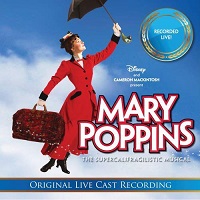 Australian Cast, 2011 (Walt Disney Records)
Australian Cast, 2011 (Walt Disney Records)  (2 / 5) This live recording of a performance of the Australian production of Mary Poppins preserves all the revisions to the show that were made after the London cast recording was released. (No cast album of the Broadway production was issued.) While there are some tweaks in arrangements and lyrics, the most notable change is the replacement of “Temper, Temper,” a nightmarish fever dream in which Jane and Michael are reprimanded by the toys they abuse in their nursery, with the less sinister “Playing the Game.” Neither song is particularly noteworthy, but “Temper, Temper” has a bit more bite to it and would probably have been given Travers’ seal of approval over “Playing the Game.” Other than that, this album isn’t much different from the London recording in terms of material. William David Brohn’s orchestrations perhaps sound a little richer here, and the cast brings a good deal of energy to their performances. The album is billed as “live,” but the performance and the engineering are clean enough that it sounds as if it were recorded in a studio, aside from some applause at the end of certain numbers. Some casting perks here are Matt Lee as an entertaining Bert and Marina Prior as an improvement over Linzi Hatley in the role of Mrs. Banks. The rest of the cast members are either equal or inferior to their London counterparts, with Judi Connelli lacking the necessary vocal heft for “Brimstone and Treacle.” Sadly, although Verity Hunt-Ballard as Mary Poppins has a pleasant voice, she can’t match Laura Michelle Kelly’s luxurious soprano, and her characterization is no better than presentable and professional. This album may please first-time listeners, but there is a greater deal of fun to be had from the previous two recordings. — M.K.
(2 / 5) This live recording of a performance of the Australian production of Mary Poppins preserves all the revisions to the show that were made after the London cast recording was released. (No cast album of the Broadway production was issued.) While there are some tweaks in arrangements and lyrics, the most notable change is the replacement of “Temper, Temper,” a nightmarish fever dream in which Jane and Michael are reprimanded by the toys they abuse in their nursery, with the less sinister “Playing the Game.” Neither song is particularly noteworthy, but “Temper, Temper” has a bit more bite to it and would probably have been given Travers’ seal of approval over “Playing the Game.” Other than that, this album isn’t much different from the London recording in terms of material. William David Brohn’s orchestrations perhaps sound a little richer here, and the cast brings a good deal of energy to their performances. The album is billed as “live,” but the performance and the engineering are clean enough that it sounds as if it were recorded in a studio, aside from some applause at the end of certain numbers. Some casting perks here are Matt Lee as an entertaining Bert and Marina Prior as an improvement over Linzi Hatley in the role of Mrs. Banks. The rest of the cast members are either equal or inferior to their London counterparts, with Judi Connelli lacking the necessary vocal heft for “Brimstone and Treacle.” Sadly, although Verity Hunt-Ballard as Mary Poppins has a pleasant voice, she can’t match Laura Michelle Kelly’s luxurious soprano, and her characterization is no better than presentable and professional. This album may please first-time listeners, but there is a greater deal of fun to be had from the previous two recordings. — M.K.
Frozen
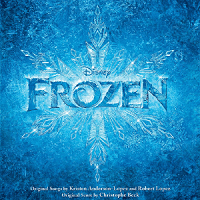 Film Soundtrack, 2013 (Walt Disney Records)
Film Soundtrack, 2013 (Walt Disney Records)  (4 / 5) One of the most popular titles in Disney’s history, Frozen revolves around two royal sisters: Elsa, who has the power to conjure snow and ice but is unable to control it, and Anna, who possesses no magical powers but is adventurous and desirous to be in love. By the end, they realize that the love they have for each other is strong enough to help Elsa control her powers, and is just as meaningful as any romantic relationship. A massive and enduring success, Frozen has received constant exposure in pop culture and media, leading many to become exhausted by the film, but first time listeners to this soundtrack will likely understand why it has continued to capture audiences. The songs, written by the married team of Kristin Anderson-Lopez and Robert Lopez (with incidental and choral scoring by Christophe Beck), are an intelligent blend of traditional musical theater and modern day pop, making the score feel both classic and current. (Doug Besterman provides lush and creative orchestrations.) The lyrics are often playful and cute while still offering strong character insight. “In Summer,” in particular, has a wittily morbid edge to it as sung by Olaf, a clueless snowman (Josh Gad) who wants nothing more than to experience warm weather, not realizing how it will effect his snow-based body. Frozen also benefits from having the strongest vocal cast for a Disney film since Beauty and the Beast, employing almost exclusively Broadway talent. In addition to Gad, we have Idina Menzel as Elsa, Kristin Bell as Anna, and Santino Fontana bringing credible Prince-ly charm to Hans. Bell gets quite a few songs to showcase her pure, classic-Disney-Princess soprano (she and Fontana work particularly well together on “Love is an Open Door”), but it’s Menzel who does the vocal heavy lifting, as in the soundtrack’s phenomenal breakout hit, “Let It Go.” Though it has been overplayed to the point of its becoming a pop culture punchline, at its core the song is well-structured and catchy, belted out by Menzel with great relish. In the movie and on this soundtrack album, only Jonathan Groff is musically wasted as Kristoff, a romantic foil for Anna, his singing limited to the thankfully short “Reindeers are Better Than People.” Otherwise, Frozen is a delight. — Matt Koplik
(4 / 5) One of the most popular titles in Disney’s history, Frozen revolves around two royal sisters: Elsa, who has the power to conjure snow and ice but is unable to control it, and Anna, who possesses no magical powers but is adventurous and desirous to be in love. By the end, they realize that the love they have for each other is strong enough to help Elsa control her powers, and is just as meaningful as any romantic relationship. A massive and enduring success, Frozen has received constant exposure in pop culture and media, leading many to become exhausted by the film, but first time listeners to this soundtrack will likely understand why it has continued to capture audiences. The songs, written by the married team of Kristin Anderson-Lopez and Robert Lopez (with incidental and choral scoring by Christophe Beck), are an intelligent blend of traditional musical theater and modern day pop, making the score feel both classic and current. (Doug Besterman provides lush and creative orchestrations.) The lyrics are often playful and cute while still offering strong character insight. “In Summer,” in particular, has a wittily morbid edge to it as sung by Olaf, a clueless snowman (Josh Gad) who wants nothing more than to experience warm weather, not realizing how it will effect his snow-based body. Frozen also benefits from having the strongest vocal cast for a Disney film since Beauty and the Beast, employing almost exclusively Broadway talent. In addition to Gad, we have Idina Menzel as Elsa, Kristin Bell as Anna, and Santino Fontana bringing credible Prince-ly charm to Hans. Bell gets quite a few songs to showcase her pure, classic-Disney-Princess soprano (she and Fontana work particularly well together on “Love is an Open Door”), but it’s Menzel who does the vocal heavy lifting, as in the soundtrack’s phenomenal breakout hit, “Let It Go.” Though it has been overplayed to the point of its becoming a pop culture punchline, at its core the song is well-structured and catchy, belted out by Menzel with great relish. In the movie and on this soundtrack album, only Jonathan Groff is musically wasted as Kristoff, a romantic foil for Anna, his singing limited to the thankfully short “Reindeers are Better Than People.” Otherwise, Frozen is a delight. — Matt Koplik
 Original Broadway Cast, 2018 (Walt Disney Records)
Original Broadway Cast, 2018 (Walt Disney Records)  (3 / 5) In the continuing line of movies translated to the stage, Disney has had an erratic track record, ranging from great success (The Lion King) to major disappointments (The Little Mermaid, Tarzan). The Broadway adaptation of Frozen, which this recording represents, lies somewhere in the middle. On the plus side, the show tries to dig deeper into its source material than most other Disney stage musicals, but the results are often middling. Kristin Anderson-Lopez and Robert Lopez have been brought back to expand their score from the film, and Dave Metzger’s orchestrations pretty much follow Doug Besterman’s blueprints. But while new songs like “Dangerous to Dream,” “Hans of the Southern Isles,” and “True Love” are commendable in their intentions to give the characters complexity, they really can’t be described as anything more than serviceably listenable. Of all the additions, the song that comes closest to standing out is “Monster,” a second-act number for Elsa — but, musically, even that feels more like a lesser “Let it Go” than a fully developed new piece. While the principal players may not be able to separate themselves completely from the original movie cast, they are all strong singers and inject plenty of personality into their performances. As the two sisters, Caissie Levy (Elsa) and Patti Murin (Anna) work particularly hard not to present cartoonish interpretations while skillfully navigating the demands of the score. The recording is also well worth a listen for Stephen Oremus’s stunning vocal arrangements, which give the pre-existing songs from the film a shot of Broadway adrenaline and provide the show’s ensemble with rich choral material (“Vuelie” and “Queen Anointed” are particularly haunting). If this recording isn’t good enough to replace Frozen’s original soundtrack, it’s worthy to stand alongside it — or a few steps behind, at least. — M.K.
(3 / 5) In the continuing line of movies translated to the stage, Disney has had an erratic track record, ranging from great success (The Lion King) to major disappointments (The Little Mermaid, Tarzan). The Broadway adaptation of Frozen, which this recording represents, lies somewhere in the middle. On the plus side, the show tries to dig deeper into its source material than most other Disney stage musicals, but the results are often middling. Kristin Anderson-Lopez and Robert Lopez have been brought back to expand their score from the film, and Dave Metzger’s orchestrations pretty much follow Doug Besterman’s blueprints. But while new songs like “Dangerous to Dream,” “Hans of the Southern Isles,” and “True Love” are commendable in their intentions to give the characters complexity, they really can’t be described as anything more than serviceably listenable. Of all the additions, the song that comes closest to standing out is “Monster,” a second-act number for Elsa — but, musically, even that feels more like a lesser “Let it Go” than a fully developed new piece. While the principal players may not be able to separate themselves completely from the original movie cast, they are all strong singers and inject plenty of personality into their performances. As the two sisters, Caissie Levy (Elsa) and Patti Murin (Anna) work particularly hard not to present cartoonish interpretations while skillfully navigating the demands of the score. The recording is also well worth a listen for Stephen Oremus’s stunning vocal arrangements, which give the pre-existing songs from the film a shot of Broadway adrenaline and provide the show’s ensemble with rich choral material (“Vuelie” and “Queen Anointed” are particularly haunting). If this recording isn’t good enough to replace Frozen’s original soundtrack, it’s worthy to stand alongside it — or a few steps behind, at least. — M.K.
Aladdin (Alan Menken et al.)
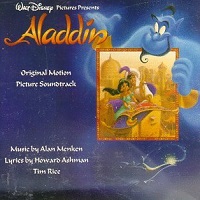 Film Soundtrack, 1992 (Walt Disney Records)
Film Soundtrack, 1992 (Walt Disney Records)  (3 / 5) Following the immense success of The Little Mermaid and Beauty and the Beast, Disney Animation firmly solidified what is now known as “The Disney Renaissance” with the critical and financial success of Aladdin in 1992. All three films featured scores with music by Alan Menken and lyrics by Howard Ashman, previously best known for their work on Little Shop of Horrors. Ashman envisioned Aladdin, the story of a teenage hoodlum who happens upon a magic lamp containing a genie, as a madcap romp set in the Middle East. But Ashman succumbed to complications from AIDS before he could finish work on the project, and some of the songs he co-wrote were ultimately not used. In fact, only three songs with lyrics by Ashman remain in the film — “Arabian Nights,” “Friend Like Me,” and “Prince Ali” — with Tim Rice providing lyrics for two additions, “One Jump Ahead” and “A Whole New World.” If Rice’s lyrics don’t have the same level of wit and character as Ashman’s, they’re still fun and don’t feel like a jarring departure. This is a very enjoyable recording, and it boasts what remains the best vocal leads of any Aladdin recording. Brad Kane is a charismatic Aladdin, blending well with Lea Salonga’s Princess Jasmine on the Oscar-winning “A Whole New World,” and Robin Williams is definitive as the genie of the lamp. Note: The deluxe edition of this soundtrack album includes bonus tracks of Howard Ashman singing demos for two songs cut from the film, the moving “Proud of Your Boy” and the fun “High Adventure.” — Matt Koplik
(3 / 5) Following the immense success of The Little Mermaid and Beauty and the Beast, Disney Animation firmly solidified what is now known as “The Disney Renaissance” with the critical and financial success of Aladdin in 1992. All three films featured scores with music by Alan Menken and lyrics by Howard Ashman, previously best known for their work on Little Shop of Horrors. Ashman envisioned Aladdin, the story of a teenage hoodlum who happens upon a magic lamp containing a genie, as a madcap romp set in the Middle East. But Ashman succumbed to complications from AIDS before he could finish work on the project, and some of the songs he co-wrote were ultimately not used. In fact, only three songs with lyrics by Ashman remain in the film — “Arabian Nights,” “Friend Like Me,” and “Prince Ali” — with Tim Rice providing lyrics for two additions, “One Jump Ahead” and “A Whole New World.” If Rice’s lyrics don’t have the same level of wit and character as Ashman’s, they’re still fun and don’t feel like a jarring departure. This is a very enjoyable recording, and it boasts what remains the best vocal leads of any Aladdin recording. Brad Kane is a charismatic Aladdin, blending well with Lea Salonga’s Princess Jasmine on the Oscar-winning “A Whole New World,” and Robin Williams is definitive as the genie of the lamp. Note: The deluxe edition of this soundtrack album includes bonus tracks of Howard Ashman singing demos for two songs cut from the film, the moving “Proud of Your Boy” and the fun “High Adventure.” — Matt Koplik
 Original Broadway Cast, 2014 (Walt Disney Records)
Original Broadway Cast, 2014 (Walt Disney Records)  (3 / 5) The success of Aladdin as an animated film led to a stage adaptation two decades later. The good news is that the results were far more successful than many other Disney transfers, though with some caveats. Choosing to underline Ashman’s original concept of presenting the story as a zany romp, the Broadway Aladdin is shinier, zippier, and sillier than the film. But while the show benefits from the inclusion of three songs with lyrics by Ashman that did not make it into the movie (“Proud of Your Boy,” “High Adventure,” and “Babkak, Omar, Aladdin, Hassim”), Chad Beguelin’s libretto isn’t quite clever enough to hold it all together. Although this is less of a problem on the cast recording than it was on a stage, enough of Beguelin’s meta-commentary jokes are peppered throughout the album (“Everyone here has a minor in dance!”) to make you roll your eyes. On the bright side, the score is given loving treatment in Danny Troob’s vibrant orchestrations and Michael Kosarin’s tight vocal arrangements. The one major misstep is turning the Genie’s “Friend Like Me” into a nearly 10-minute-long production number. While it’s performed energetically by James Monroe Iglehart, the song now feels overstuffed and tiresome. Iglehart is given a much better opportunity with “Prince Ali,” which has also been expanded from the film version, but to more satisfying effect. New additions to the score, such as “These Palace Walls” and “A Million Miles Away,” are pleasant enough, with Menken once again proving his gift for ear worms, but Beguelin’s lyrics are not on the same level as his predecessors’. Adam Jacobs gives an earnest performance as Aladdin, which works in ballads like “Proud of Your Boy” and “A Whole New World” but less well in peppier songs like “One Jump Ahead.” Courtney Reed’s Jasmine is mostly serviceable, though her voice is not as comfortable a fit for “A Whole New World” as Lea Salonga’s. And in a fun bit of déjà vu, Jonathan Freeman vamps it up as the evil villain Jafar, the part he voiced in the 1992 film. If this recording doesn’t have the overall charm of the original soundtrack, it’s still enjoyable, and it introduces audiences to some wonderful Ashman/Menken songs that had previously gone unheard. — M.K.
(3 / 5) The success of Aladdin as an animated film led to a stage adaptation two decades later. The good news is that the results were far more successful than many other Disney transfers, though with some caveats. Choosing to underline Ashman’s original concept of presenting the story as a zany romp, the Broadway Aladdin is shinier, zippier, and sillier than the film. But while the show benefits from the inclusion of three songs with lyrics by Ashman that did not make it into the movie (“Proud of Your Boy,” “High Adventure,” and “Babkak, Omar, Aladdin, Hassim”), Chad Beguelin’s libretto isn’t quite clever enough to hold it all together. Although this is less of a problem on the cast recording than it was on a stage, enough of Beguelin’s meta-commentary jokes are peppered throughout the album (“Everyone here has a minor in dance!”) to make you roll your eyes. On the bright side, the score is given loving treatment in Danny Troob’s vibrant orchestrations and Michael Kosarin’s tight vocal arrangements. The one major misstep is turning the Genie’s “Friend Like Me” into a nearly 10-minute-long production number. While it’s performed energetically by James Monroe Iglehart, the song now feels overstuffed and tiresome. Iglehart is given a much better opportunity with “Prince Ali,” which has also been expanded from the film version, but to more satisfying effect. New additions to the score, such as “These Palace Walls” and “A Million Miles Away,” are pleasant enough, with Menken once again proving his gift for ear worms, but Beguelin’s lyrics are not on the same level as his predecessors’. Adam Jacobs gives an earnest performance as Aladdin, which works in ballads like “Proud of Your Boy” and “A Whole New World” but less well in peppier songs like “One Jump Ahead.” Courtney Reed’s Jasmine is mostly serviceable, though her voice is not as comfortable a fit for “A Whole New World” as Lea Salonga’s. And in a fun bit of déjà vu, Jonathan Freeman vamps it up as the evil villain Jafar, the part he voiced in the 1992 film. If this recording doesn’t have the overall charm of the original soundtrack, it’s still enjoyable, and it introduces audiences to some wonderful Ashman/Menken songs that had previously gone unheard. — M.K.
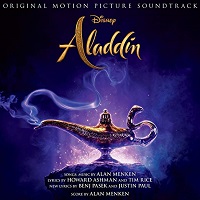 Film Soundtrack, 2019 (Walt Disney Records)
Film Soundtrack, 2019 (Walt Disney Records)  (1 / 5) This is the soundtrack recording of Disney’s recent live action remake of Aladdin, a trend the company has continued ever since the massive financial success it had with its remake of Beauty and the Beast. The Aladdin soundtrack is not nearly the disaster that Beast was: the arrangements are mostly similar to the originals (though some pop and hip hop influenced percussion has been added), and the cast is of a higher vocal caliber (if still auto-tuned). Yet, the recording is mostly free of personality; everything is clear and pleasant enough, but it’s missing energy and character. Nowhere is this more evident than in Will Smith’s performance as the Genie. Whereas both Robin Williams and James Monroe Iglehart gave everything they had to the role, Smith goes for a more laid back, casual approach to the magical sidekick. This is a mistake, and though he doesn’t completely bungle his two big songs, “Friend Like Me” and “Prince Ali,” they barely register here. Mena Massoud and Naomi Scott are both fine as, respectively, Aladdin and Princess Jasmine, but they certainly don’t wipe away memories of their predecessors in these roles. Scott has been given a new number written by Menken with lyrics by Benj Pasek and Justin Paul, “Speechless,” but the lyrics are so nondescript and the melody so jarringly different from the rest of the score that it doesn’t do anything to distinguish Scott’s Jasmine from Salonga’s or Reed’s. So, while this isn’t the worst soundtrack of a Disney remake, it’s the blandest of all three Aladdin recordings and is really more for completists than for anyone who want to be exposed to the score for the first time. — M.K.
(1 / 5) This is the soundtrack recording of Disney’s recent live action remake of Aladdin, a trend the company has continued ever since the massive financial success it had with its remake of Beauty and the Beast. The Aladdin soundtrack is not nearly the disaster that Beast was: the arrangements are mostly similar to the originals (though some pop and hip hop influenced percussion has been added), and the cast is of a higher vocal caliber (if still auto-tuned). Yet, the recording is mostly free of personality; everything is clear and pleasant enough, but it’s missing energy and character. Nowhere is this more evident than in Will Smith’s performance as the Genie. Whereas both Robin Williams and James Monroe Iglehart gave everything they had to the role, Smith goes for a more laid back, casual approach to the magical sidekick. This is a mistake, and though he doesn’t completely bungle his two big songs, “Friend Like Me” and “Prince Ali,” they barely register here. Mena Massoud and Naomi Scott are both fine as, respectively, Aladdin and Princess Jasmine, but they certainly don’t wipe away memories of their predecessors in these roles. Scott has been given a new number written by Menken with lyrics by Benj Pasek and Justin Paul, “Speechless,” but the lyrics are so nondescript and the melody so jarringly different from the rest of the score that it doesn’t do anything to distinguish Scott’s Jasmine from Salonga’s or Reed’s. So, while this isn’t the worst soundtrack of a Disney remake, it’s the blandest of all three Aladdin recordings and is really more for completists than for anyone who want to be exposed to the score for the first time. — M.K.
Inner City
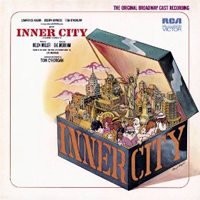 Original Broadway Cast, 1971 (RCA/Masterworks Broadway)
Original Broadway Cast, 1971 (RCA/Masterworks Broadway)  (4 / 5) Perhaps the source material was too obscure for audiences to really understand this show, which only ran on Broadway for 97 performances (and 24 previews). What poet Eve Merriam originally wrote was Inner City Mother Goose, a new take on nursery rhymes from an urban, sometimes violent perspective. So the familiar “Fee Fi Fo Fum” was followed by the less-expected “I smell the blood of violence to come,” while “Now I lay me down to sleep” was followed by “and I pray the double lock will keep.” Helen Miller set the poems to theatrical rock music. Most of them last a minute or less, but they’re memorable minutes. In “Hushabye Baby,” an unwed teenager sings about the child she’ll soon have, and it sounds like something that Brecht and Weill might have written had they been around in the early 1970s. Other highlights include “On This Rock,” a statement of urban pride; the jaunty “City Life”; and the pulsating “Law and Order,” which the TV series of the same title should have used as its theme song. “Deep in the Night” and “It’s My Belief” are solid anthems that helped win Linda Hopkins a Tony Award as Best Featured Actress. Then there’s “The Hooker,” in which a prostitute sings, “If they want to hear a story, then I give out with a story…I need ten dollars for grandma, who is coughing and spitting up blood. But whaddaya say we cut the crap?” The same socko melody is used for both “The Pusher” and “The Pickpocket,” but that last one didn’t make the album. That’s all right, we should be very grateful that this short-running show yielded a cast recording at all. — Peter Filichia
(4 / 5) Perhaps the source material was too obscure for audiences to really understand this show, which only ran on Broadway for 97 performances (and 24 previews). What poet Eve Merriam originally wrote was Inner City Mother Goose, a new take on nursery rhymes from an urban, sometimes violent perspective. So the familiar “Fee Fi Fo Fum” was followed by the less-expected “I smell the blood of violence to come,” while “Now I lay me down to sleep” was followed by “and I pray the double lock will keep.” Helen Miller set the poems to theatrical rock music. Most of them last a minute or less, but they’re memorable minutes. In “Hushabye Baby,” an unwed teenager sings about the child she’ll soon have, and it sounds like something that Brecht and Weill might have written had they been around in the early 1970s. Other highlights include “On This Rock,” a statement of urban pride; the jaunty “City Life”; and the pulsating “Law and Order,” which the TV series of the same title should have used as its theme song. “Deep in the Night” and “It’s My Belief” are solid anthems that helped win Linda Hopkins a Tony Award as Best Featured Actress. Then there’s “The Hooker,” in which a prostitute sings, “If they want to hear a story, then I give out with a story…I need ten dollars for grandma, who is coughing and spitting up blood. But whaddaya say we cut the crap?” The same socko melody is used for both “The Pusher” and “The Pickpocket,” but that last one didn’t make the album. That’s all right, we should be very grateful that this short-running show yielded a cast recording at all. — Peter Filichia
Pretty Woman
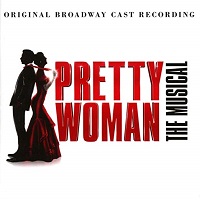 Original Broadway Cast, 2018 (Atlantic) 0 stars; not recommended. Movies that were popular in the latter part of the 20th century have become the go-to source material for Broadway musicals these days. If a film is beloved, a show based on it has a built in audience, and if the movie was made more than 20 years ago, the show can cash in on the “nostalgia factor.” Or so the thinking goes. This cynical mentality is nowhere more prominently seen than in Pretty Woman: The Musical. Based on the wildly successful 1990 romantic comedy, the show tries to please its audience by sticking so closely to the original screenplay that whole scenes are recreated line for line. (Garry Marshall, the film’s director, worked on the libretto with J.F. Lawton before his death in 2016.) It also trades on nostalgia by bringing in ’80s-’90s pop-rock team Bryan Adams and Jim Vallance to write the score, and if none of the songs are offensively unlistenable, they’re all ultimately unnecessary. Each one starts by stating the basic intention of the character singing it, usually at a grooving tempo, with the following verses essentially rewording that same sentiment in a higher key and at a faster tempo. While this allows power belters like Samantha Barks and Orfeh to wail appropriately, it does little for the story. One need only read generic song titles such as “I Can’t Go Back,” “Something About Her” and “Never Give Up On a Dream” to understand the lack of insight Adams and Vallance have brought to the score. Set in a sanitized version of LA, the show follows Vivian (Barks, in the role that made Julia Roberts a movie star), a down-on-her-luck hooker who’s hired by reserved billionaire Edward (Andy Karl) as his escort for the week. After some playful banter and small blowups, the two fall in love, and all turns out well in the end. As Vivian, Barks decides not to channel Roberts’ bubbly charm in the film and go for a more nuanced performance, but her attempts are undermined at every turn by the banality of the lyrics and the repetitiveness of the music. Though Karl’s faux rock and roll growl suits the score’s style, he is ultimately wasted in the role of the withdrawn Edward. As Vivian’s spunky fellow prostitute Kit, Orfeh goes for broke and pulls out every vocal trick she has on songs like “Rodeo Drive” and “Never Give Up on a Dream.” But, like her costars, she’s failed by the lifeless pop tunes. Only Allison Blackwell, in a featured spot, gets any music with energy in it, during the sequence when Edward takes Vivian to the opera — but this is because she gets to sing a bit of La Traviata, which orchestrator/arranger Will Van Dyke seamlessly incorporates into the Adams-Vallance song “You and I.” It’s a memorable moment in a recording you’ll otherwise forget about as soon as you finish listening to it. — Matt Koplik
Original Broadway Cast, 2018 (Atlantic) 0 stars; not recommended. Movies that were popular in the latter part of the 20th century have become the go-to source material for Broadway musicals these days. If a film is beloved, a show based on it has a built in audience, and if the movie was made more than 20 years ago, the show can cash in on the “nostalgia factor.” Or so the thinking goes. This cynical mentality is nowhere more prominently seen than in Pretty Woman: The Musical. Based on the wildly successful 1990 romantic comedy, the show tries to please its audience by sticking so closely to the original screenplay that whole scenes are recreated line for line. (Garry Marshall, the film’s director, worked on the libretto with J.F. Lawton before his death in 2016.) It also trades on nostalgia by bringing in ’80s-’90s pop-rock team Bryan Adams and Jim Vallance to write the score, and if none of the songs are offensively unlistenable, they’re all ultimately unnecessary. Each one starts by stating the basic intention of the character singing it, usually at a grooving tempo, with the following verses essentially rewording that same sentiment in a higher key and at a faster tempo. While this allows power belters like Samantha Barks and Orfeh to wail appropriately, it does little for the story. One need only read generic song titles such as “I Can’t Go Back,” “Something About Her” and “Never Give Up On a Dream” to understand the lack of insight Adams and Vallance have brought to the score. Set in a sanitized version of LA, the show follows Vivian (Barks, in the role that made Julia Roberts a movie star), a down-on-her-luck hooker who’s hired by reserved billionaire Edward (Andy Karl) as his escort for the week. After some playful banter and small blowups, the two fall in love, and all turns out well in the end. As Vivian, Barks decides not to channel Roberts’ bubbly charm in the film and go for a more nuanced performance, but her attempts are undermined at every turn by the banality of the lyrics and the repetitiveness of the music. Though Karl’s faux rock and roll growl suits the score’s style, he is ultimately wasted in the role of the withdrawn Edward. As Vivian’s spunky fellow prostitute Kit, Orfeh goes for broke and pulls out every vocal trick she has on songs like “Rodeo Drive” and “Never Give Up on a Dream.” But, like her costars, she’s failed by the lifeless pop tunes. Only Allison Blackwell, in a featured spot, gets any music with energy in it, during the sequence when Edward takes Vivian to the opera — but this is because she gets to sing a bit of La Traviata, which orchestrator/arranger Will Van Dyke seamlessly incorporates into the Adams-Vallance song “You and I.” It’s a memorable moment in a recording you’ll otherwise forget about as soon as you finish listening to it. — Matt KoplikHadestown
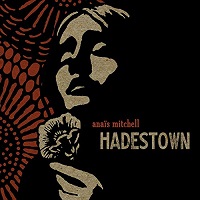 Studio Cast, 2010 (Wilderland Records)
Studio Cast, 2010 (Wilderland Records)  (3 / 5) Though indie singer/songwriter Anaïs Mitchell always meant for Hadestown to be a stage musical, its first incarnation was in the form of this concept album, recorded for posterity and to give the piece greater audience outreach. The response was overwhelmingly strong, and Hadestown grew a dedicated fan base over the years until a production opened at the New York Theatre Workshop in 2016, followed by the show’s Broadway premiere in 2019. Considering the immediately intense response from fans, it’s surprising now to hear how simplistic this album is; compared to other concept albums that became stage musicals (Evita, for example), this one is a much more relaxed affair. Based on the Greek myth of Orpheus, who travels to the Underworld (“Hadestown”) to bring back his love Eurydice, the piece as heard on this recording is a fairly straightforward retelling of the myth and is mostly a platform for Mitchell’s talents as a songwriter. Her music can groove festively (“Way Down in Hadestown,” “When the Chips Are Down”) or float dreamlike (“Wedding Song,” “Wait For Me”), always with an edgy undercurrent that foreshadows the danger lying ahead. Mitchell’s lyrics are poetically expressive, though they become sharper and more story-driven on the later cast albums. Here, Mitchell herself sings the role of Eurydice, while Justin Vernon performs Orpheus. An odd choice is made in the mixing of the latter’s vocals, so that it sounds like multiple Vernons are singing together each time Orpheus is present. (According to the myth, Orpheus possessed a mystically beautiful singing voice, and the mixing may have been meant to reflect that, but the effect is off-putting.) Those who were unfamiliar with Hadestown until it came to Broadway and who desire to hear its origins will find this album mostly engaging, but subsequent recordings of the score are superior and, of course, more indicative of what the piece eventually became. — Matt Koplik
(3 / 5) Though indie singer/songwriter Anaïs Mitchell always meant for Hadestown to be a stage musical, its first incarnation was in the form of this concept album, recorded for posterity and to give the piece greater audience outreach. The response was overwhelmingly strong, and Hadestown grew a dedicated fan base over the years until a production opened at the New York Theatre Workshop in 2016, followed by the show’s Broadway premiere in 2019. Considering the immediately intense response from fans, it’s surprising now to hear how simplistic this album is; compared to other concept albums that became stage musicals (Evita, for example), this one is a much more relaxed affair. Based on the Greek myth of Orpheus, who travels to the Underworld (“Hadestown”) to bring back his love Eurydice, the piece as heard on this recording is a fairly straightforward retelling of the myth and is mostly a platform for Mitchell’s talents as a songwriter. Her music can groove festively (“Way Down in Hadestown,” “When the Chips Are Down”) or float dreamlike (“Wedding Song,” “Wait For Me”), always with an edgy undercurrent that foreshadows the danger lying ahead. Mitchell’s lyrics are poetically expressive, though they become sharper and more story-driven on the later cast albums. Here, Mitchell herself sings the role of Eurydice, while Justin Vernon performs Orpheus. An odd choice is made in the mixing of the latter’s vocals, so that it sounds like multiple Vernons are singing together each time Orpheus is present. (According to the myth, Orpheus possessed a mystically beautiful singing voice, and the mixing may have been meant to reflect that, but the effect is off-putting.) Those who were unfamiliar with Hadestown until it came to Broadway and who desire to hear its origins will find this album mostly engaging, but subsequent recordings of the score are superior and, of course, more indicative of what the piece eventually became. — Matt Koplik
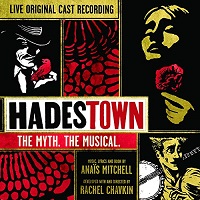 Original Off-Broadway Cast, 2017 (Warner Classics)
Original Off-Broadway Cast, 2017 (Warner Classics)  (4 / 5) Recorded live at the New York Theatre Workshop, this album has high-energy performances and a number of welcome changes to Hadestown since its original incarnation. The biggest change is that the the piece as heard here is no longer so straightforward a re-telling of the Orpheus and Eurydice myth, but builds upon it by expanding characters that didn’t have much presence on the original recording and giving them more active roles. These include the messenger god Hermes (Chris Sullivan), who now narrates the proceedings. A trio of actresses called The Fates are more fully present as a Greek Chorus, and the story of Hades (a quietly domineering Patrick Page) and his wife, Persephone (Amber Grey), is explored with greater depth here, showing us how their marriage, once passionate but now cold, has detrimentally effected the characters on earth. These changes make Hadestown a more fulfilling and well rounded piece, but they also create a new problem: Mitchell has written the supporting characters with a hard edge and a playful attitude, whereas her songs for Orpheus and Eurydice have a more earnest romanticism. On a surface level, this makes sense, as the young pair are meant to be the heart of the piece. But in giving the supporting characters such rich, lively material, Mitchell has made them more interesting than the two leads. It doesn’t help that several of Orpheus and Eurydice’s songs included in the NYTW production are inexplicably not on the album. (“Wedding Song” is a major loss). Considering all of this, Damon Daunno and Nabiyah Be do admirable work as the doomed lovers. In fact, Daunno, is perhaps the best Orpheus heard on any of the official Hadestown recordings; he gives the character a confident, passionate swagger, and his voice sails smoothly through Mitchell’s score, seamlessly gliding in and out of a pure falsetto. Generally speaking, what’s presented on this recording is so well done that it almost makes up for the material that isn’t included. Fan favorites from the concept album, such as Orpheus’ “Wait for Me” or Hades’ scarily relevant “Why We Build the Wall,” are still here, but Mitchell’s additions are also worth noting: Persephone is given the jaunty “Livin it Up On Top,” gracefully vamped by Grey, and Hermes begins the show with a new opening number, “Road to Hell.” From the moment a trombone wails a jazzy, New Orleans-fueled intro to that song (orchestraters Michael Chorney and Todd Sickafoose continue from the concept album), you know that the energy of Hadestown has shifted from relaxed mysticism to hot theatricality. It’s a welcome change. — M.K.
(4 / 5) Recorded live at the New York Theatre Workshop, this album has high-energy performances and a number of welcome changes to Hadestown since its original incarnation. The biggest change is that the the piece as heard here is no longer so straightforward a re-telling of the Orpheus and Eurydice myth, but builds upon it by expanding characters that didn’t have much presence on the original recording and giving them more active roles. These include the messenger god Hermes (Chris Sullivan), who now narrates the proceedings. A trio of actresses called The Fates are more fully present as a Greek Chorus, and the story of Hades (a quietly domineering Patrick Page) and his wife, Persephone (Amber Grey), is explored with greater depth here, showing us how their marriage, once passionate but now cold, has detrimentally effected the characters on earth. These changes make Hadestown a more fulfilling and well rounded piece, but they also create a new problem: Mitchell has written the supporting characters with a hard edge and a playful attitude, whereas her songs for Orpheus and Eurydice have a more earnest romanticism. On a surface level, this makes sense, as the young pair are meant to be the heart of the piece. But in giving the supporting characters such rich, lively material, Mitchell has made them more interesting than the two leads. It doesn’t help that several of Orpheus and Eurydice’s songs included in the NYTW production are inexplicably not on the album. (“Wedding Song” is a major loss). Considering all of this, Damon Daunno and Nabiyah Be do admirable work as the doomed lovers. In fact, Daunno, is perhaps the best Orpheus heard on any of the official Hadestown recordings; he gives the character a confident, passionate swagger, and his voice sails smoothly through Mitchell’s score, seamlessly gliding in and out of a pure falsetto. Generally speaking, what’s presented on this recording is so well done that it almost makes up for the material that isn’t included. Fan favorites from the concept album, such as Orpheus’ “Wait for Me” or Hades’ scarily relevant “Why We Build the Wall,” are still here, but Mitchell’s additions are also worth noting: Persephone is given the jaunty “Livin it Up On Top,” gracefully vamped by Grey, and Hermes begins the show with a new opening number, “Road to Hell.” From the moment a trombone wails a jazzy, New Orleans-fueled intro to that song (orchestraters Michael Chorney and Todd Sickafoose continue from the concept album), you know that the energy of Hadestown has shifted from relaxed mysticism to hot theatricality. It’s a welcome change. — M.K.
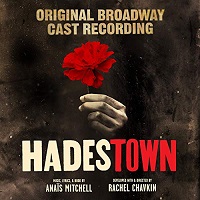 Original Broadway Cast, 2019 (Sing It Again Records)
Original Broadway Cast, 2019 (Sing It Again Records)  (5 / 5) After the workshop production at NYTW, Hadestown was staged in Canada and at the Royal National Theatre in London, where it continued to develop until it finally came to Broadway nearly a decade after the release of the concept album. On stage, the result is often breathtaking, with Mitchell’s score embracing its theatrical potential and director Rachel Chavkin and her team of designers working visual wonders. Some have complained that, in turning Hadestown into a full evening of theater, Mitchell overstuffed the piece with unnecessary material. There’s a certain amount of truth there, in that, when the show is experienced live on stage, some numbers feel less important than others and/or seem to reiterate points made previously. But when one is listening to the cast recording, all of those complaints melt away, and we’re left with Mitchell’s fantastic work sung by a phenomenal company. Grey and Page are back as Persephone and Hades, with André de Shields offering a wiser and kinder Hermes than his predecessors. Eva Noblezada is a passionately sung Eurydice; her performance, and the addition of “Any Way the Wind Blows” (an already established song of Mitchell’s), give the character some much needed grit. Reeve Carney’s interpretation of Orpheus is more of a wandering man-child than the swaggering heartthrob offered by Daunno; this is a valid choice, although it does rob the character’s romantic pairing with Eurydice of some heat. Also, while Carney has a strong voice and does well by the material, his singing is not quite as smooth and effortless as Daunno’s. Still, these are small quibbles about what is overall a terrific album. One of its major highlights is “Wait for Me,” Orpheus’ cry to Eurydice as he travels to the Underworld to save her. While the song was moving and pretty on the concept album, Mitchell, Chorney and Sickafoose here have shaped it into something spectacularly theatrical. And, speaking of waiting: Fans of Hadestown had to wait almost 10 years for the piece to become a completely satisfying stage musical, but their patience has been well rewarded. — M.K.
(5 / 5) After the workshop production at NYTW, Hadestown was staged in Canada and at the Royal National Theatre in London, where it continued to develop until it finally came to Broadway nearly a decade after the release of the concept album. On stage, the result is often breathtaking, with Mitchell’s score embracing its theatrical potential and director Rachel Chavkin and her team of designers working visual wonders. Some have complained that, in turning Hadestown into a full evening of theater, Mitchell overstuffed the piece with unnecessary material. There’s a certain amount of truth there, in that, when the show is experienced live on stage, some numbers feel less important than others and/or seem to reiterate points made previously. But when one is listening to the cast recording, all of those complaints melt away, and we’re left with Mitchell’s fantastic work sung by a phenomenal company. Grey and Page are back as Persephone and Hades, with André de Shields offering a wiser and kinder Hermes than his predecessors. Eva Noblezada is a passionately sung Eurydice; her performance, and the addition of “Any Way the Wind Blows” (an already established song of Mitchell’s), give the character some much needed grit. Reeve Carney’s interpretation of Orpheus is more of a wandering man-child than the swaggering heartthrob offered by Daunno; this is a valid choice, although it does rob the character’s romantic pairing with Eurydice of some heat. Also, while Carney has a strong voice and does well by the material, his singing is not quite as smooth and effortless as Daunno’s. Still, these are small quibbles about what is overall a terrific album. One of its major highlights is “Wait for Me,” Orpheus’ cry to Eurydice as he travels to the Underworld to save her. While the song was moving and pretty on the concept album, Mitchell, Chorney and Sickafoose here have shaped it into something spectacularly theatrical. And, speaking of waiting: Fans of Hadestown had to wait almost 10 years for the piece to become a completely satisfying stage musical, but their patience has been well rewarded. — M.K.
 London Cast, 2024 (Sing it Again Records)
London Cast, 2024 (Sing it Again Records)  (3.5 / 5) Hadestown first hit the London stage in a limited engagement at the National Theatre in 2018, as part of its pre-Broadway tryout. Due to the show’s massive success since then, it returned to the West End in 2024, resulting in this album, recorded live at the Lyric Theatre. As an addition to the Hadestown discography, it does have a few demerits. First, and most importantly, what’s presented here is not the entire score; songs such as “Any Way the Wind Blows” and “Hey Little Songbird” are missing, not to mention the first half of the second act. Next, because this recording is live, listeners who are used to the clear, pristine sound of the Broadway album will have a harder time catching the details of the orchestrations. Finally, while Dónal Finn makes for a smoldering Orpheus, his voice — particularly his falsetto — is less mellifluous than those of his predecessors, making some of the quieter moments of his songs sound a bit uncomfortable for him. Still, even with these caveats, this might be the most highly energetic and passionate recording of Anaïs Mitchell’s score yet. Melanie La Barrie’s Hermes kicks things off to a rousing start with “Road to Hell,” and that level of energy continues through the entire performance. Finn is well matched by Grace Hodgett Young’s tough-as-nails Eurydice; their rendition of the “Wedding Song” is particularly steamy. Zachary James’ Hades is appropriately menacing, and Gloria Onitiri makes such a strong impression as Persephone that it’s all the more disheartening not to have “Our Lady of the Underground” included here. If this album had offered the entirety of Mitchell’s score, it could’ve rivaled the original Broadway cast recording. As it stands, it serves as an exciting and fun companion to it. –– M.K.
(3.5 / 5) Hadestown first hit the London stage in a limited engagement at the National Theatre in 2018, as part of its pre-Broadway tryout. Due to the show’s massive success since then, it returned to the West End in 2024, resulting in this album, recorded live at the Lyric Theatre. As an addition to the Hadestown discography, it does have a few demerits. First, and most importantly, what’s presented here is not the entire score; songs such as “Any Way the Wind Blows” and “Hey Little Songbird” are missing, not to mention the first half of the second act. Next, because this recording is live, listeners who are used to the clear, pristine sound of the Broadway album will have a harder time catching the details of the orchestrations. Finally, while Dónal Finn makes for a smoldering Orpheus, his voice — particularly his falsetto — is less mellifluous than those of his predecessors, making some of the quieter moments of his songs sound a bit uncomfortable for him. Still, even with these caveats, this might be the most highly energetic and passionate recording of Anaïs Mitchell’s score yet. Melanie La Barrie’s Hermes kicks things off to a rousing start with “Road to Hell,” and that level of energy continues through the entire performance. Finn is well matched by Grace Hodgett Young’s tough-as-nails Eurydice; their rendition of the “Wedding Song” is particularly steamy. Zachary James’ Hades is appropriately menacing, and Gloria Onitiri makes such a strong impression as Persephone that it’s all the more disheartening not to have “Our Lady of the Underground” included here. If this album had offered the entirety of Mitchell’s score, it could’ve rivaled the original Broadway cast recording. As it stands, it serves as an exciting and fun companion to it. –– M.K.
Tina: The Tina Turner Musical
 Original London Cast, 2019 (Ghostlight)
Original London Cast, 2019 (Ghostlight)  (3 / 5) When experienced live in the theater, a “bio-musical” — like any other show — may be judged on several levels, including the production values and the quality of the storytelling, over and above the performances. But a cast album is all about the music. In that regard, this recording of Tina: The Tina Turner Musical, shorn of the show’s execrable book and direction, succeeds thanks to the searing, passionate singing of Adrienne Warren in the title role. Also a pleasure to hear are the arrangements (by Nicholas Skilbeck) and orchestrations (by Ethan Popp), which deftly approximate the original charts of the songs that brought Turner worldwide fame during her decades-long career as a rock music goddess. Warren was an Olivier Award nominee for this role on the London stage, and her portrayal was considered so vital to the show’s success that she was signed to repeat it on Broadway. Pick any tracks from the album at random — for example, “River Deep – Mountain High,” “Proud Mary,” “Private Dancer,” or “What’s Love Got to Do With It?” — and you may find yourself marveling at how skillfully Warren pays tribute to the icon’s one-of-a-kind voice and delivery while still making her performance sound organic, something deeper than sheer mimicry. The other singers heard here are fine, including Kobna Holdbrook-Smith as Ike Turner. Still, the recording is All About Warren, and she will not disappoint those who feel they want an audio memento of this show even though, of course, Turner’s actual recordings of these songs are still and no doubt always will be very much available — Michael Portantiere
(3 / 5) When experienced live in the theater, a “bio-musical” — like any other show — may be judged on several levels, including the production values and the quality of the storytelling, over and above the performances. But a cast album is all about the music. In that regard, this recording of Tina: The Tina Turner Musical, shorn of the show’s execrable book and direction, succeeds thanks to the searing, passionate singing of Adrienne Warren in the title role. Also a pleasure to hear are the arrangements (by Nicholas Skilbeck) and orchestrations (by Ethan Popp), which deftly approximate the original charts of the songs that brought Turner worldwide fame during her decades-long career as a rock music goddess. Warren was an Olivier Award nominee for this role on the London stage, and her portrayal was considered so vital to the show’s success that she was signed to repeat it on Broadway. Pick any tracks from the album at random — for example, “River Deep – Mountain High,” “Proud Mary,” “Private Dancer,” or “What’s Love Got to Do With It?” — and you may find yourself marveling at how skillfully Warren pays tribute to the icon’s one-of-a-kind voice and delivery while still making her performance sound organic, something deeper than sheer mimicry. The other singers heard here are fine, including Kobna Holdbrook-Smith as Ike Turner. Still, the recording is All About Warren, and she will not disappoint those who feel they want an audio memento of this show even though, of course, Turner’s actual recordings of these songs are still and no doubt always will be very much available — Michael Portantiere
Ain’t Too Proud: The Life and Times of the Temptations
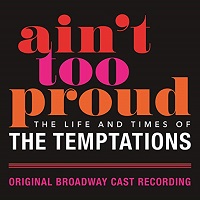 Original Broadway Cast, 2019 (Universal Music)
Original Broadway Cast, 2019 (Universal Music)  (5 / 5) There’s always a sense of déjà vu when a jukebox musical opens on Broadway, as most people walk in humming the tunes. If Ain’t Too Proud: The Life and Times of the Temptations doubles that feeling, it might be due to another “ain’t” from distant memory: Ain’t Misbehavin’, the first jukebox revue to take home the Tony Award for Best Musical. Ain’t Too Proud offers audiences just what that 1978 show did, with great songs delivered in great performances. Praised for its spirited direction (Des McAnuff), clever book (Dominique Morisseau), and high-voltage choreography by Sergio Trujillo, who took home a Tony for his work, Ain’t Too Proud also delivers the goods in its cast recording. The energy of what’s being performed eight times a week at the Imperial Theatre is all here in an album made up of more than two dozen Temptations songs, featuring the one-of-a-kind Detroit rock & roll rhythms and harmonies for which the group became famous. Highlights include such favorites as “My Girl,” “Just My Imagination,” “Get Ready,” and “Papa Was a Rolling Stone.” As the show’s storytelling reveals, there were more than a few “Temps” over the course of the group’s long career besides its original foursome. But Derrick Baskin, James Harkness, Jawan M. Jackson, Jeremy Pope, and Ephraim Sykes stand front and center, leading a tremendously talented cast. The recording also offers a good deal of interstitial narrative, directly from the show’s book, that aids in the appreciation of the story. (Of course, if you so choose, you can eliminate those tracks and custom design the album for your own listening pleasure). Mention should also be made of the fine orchestrations by Harold Wheeler, who at age 75 had his legendary, 50-year Broadway career capped with a special 2019 Tony Award for his contribution to the American musical. — Ron Fassler
(5 / 5) There’s always a sense of déjà vu when a jukebox musical opens on Broadway, as most people walk in humming the tunes. If Ain’t Too Proud: The Life and Times of the Temptations doubles that feeling, it might be due to another “ain’t” from distant memory: Ain’t Misbehavin’, the first jukebox revue to take home the Tony Award for Best Musical. Ain’t Too Proud offers audiences just what that 1978 show did, with great songs delivered in great performances. Praised for its spirited direction (Des McAnuff), clever book (Dominique Morisseau), and high-voltage choreography by Sergio Trujillo, who took home a Tony for his work, Ain’t Too Proud also delivers the goods in its cast recording. The energy of what’s being performed eight times a week at the Imperial Theatre is all here in an album made up of more than two dozen Temptations songs, featuring the one-of-a-kind Detroit rock & roll rhythms and harmonies for which the group became famous. Highlights include such favorites as “My Girl,” “Just My Imagination,” “Get Ready,” and “Papa Was a Rolling Stone.” As the show’s storytelling reveals, there were more than a few “Temps” over the course of the group’s long career besides its original foursome. But Derrick Baskin, James Harkness, Jawan M. Jackson, Jeremy Pope, and Ephraim Sykes stand front and center, leading a tremendously talented cast. The recording also offers a good deal of interstitial narrative, directly from the show’s book, that aids in the appreciation of the story. (Of course, if you so choose, you can eliminate those tracks and custom design the album for your own listening pleasure). Mention should also be made of the fine orchestrations by Harold Wheeler, who at age 75 had his legendary, 50-year Broadway career capped with a special 2019 Tony Award for his contribution to the American musical. — Ron Fassler
The Band’s Visit
 Original Broadway Cast, 2017 (Ghostlight)
Original Broadway Cast, 2017 (Ghostlight)  (5 / 5) Stranded in an Israeli desert town by mistake, an Egyptian band stays overnight with the locals before heading on to their engagement. Composer-lyricist David Yazbek has created a luminous score that highlights not the differences between these strangers, but their commonality, mankind’s shared needs for love and connection. The music incorporates klezmer influences and American jazz, but especially Arabic folk and classical idioms and instruments: the oud, riq, and darbouka. Katrina Lenk’s nuanced voice brings life to the role of cafe owner Dina; she and her friends offer the Egyptians a heaping dish of sarcasm and watermelon in “Welcome to Nowhere.” (Their sleepy village has more “blah, blah, blah” than that Gershwin song.) “It Is What It Is” hints at Dina’s history, but the haunting “Omar Sharif” reveals more, describing how young Dina and her mother adored Sharif movies and the exotic singing of Oum Kaltoum. This admission resonates with Tewfiq, the Egyptian band’s buttoned-up conductor (Tony Shaloub). His single solo is an a cappella number in Arabic, “Itgara’a,” hinting at inner sorrows. Yazbek deftly slides the concluding phrase of “Itgara’a” into Dina’s response, “Something Different.” The other Egyptians also forge bonds with the Israelis, often through music. “The Beat of Your Heart” is an exuberant memory song, evoking how former musician Avrum (Andrew Polk) met his late wife; Camal (George Abud) and Simon (Alok Tewari) joyfully add their violin and clarinet. The awkward Papi (Etai Benson) relates his trouble with girls in the hilarious “Papi Hears the Ocean,” so Haled (Ari’el Stachel) advises him in the style of his idol, Chet Baker (“Haled’s Song About Love””). Camal accompanies Itzik (John Cariani) as he soothes his child in “Itzik’s Lullaby.” The transcendent “Answer Me” concludes the vocals, sung by the “Telephone Guy” (Adam Kantor), who’s forever waiting by the village’s single pay phone in the hope that his girlfriend will call. For a few glorious seconds, the entire company joins in, reflecting the basic human need for connection. Like the Telephone Guy, our ears are “thirsty” for more of that. – Laura Frankos
(5 / 5) Stranded in an Israeli desert town by mistake, an Egyptian band stays overnight with the locals before heading on to their engagement. Composer-lyricist David Yazbek has created a luminous score that highlights not the differences between these strangers, but their commonality, mankind’s shared needs for love and connection. The music incorporates klezmer influences and American jazz, but especially Arabic folk and classical idioms and instruments: the oud, riq, and darbouka. Katrina Lenk’s nuanced voice brings life to the role of cafe owner Dina; she and her friends offer the Egyptians a heaping dish of sarcasm and watermelon in “Welcome to Nowhere.” (Their sleepy village has more “blah, blah, blah” than that Gershwin song.) “It Is What It Is” hints at Dina’s history, but the haunting “Omar Sharif” reveals more, describing how young Dina and her mother adored Sharif movies and the exotic singing of Oum Kaltoum. This admission resonates with Tewfiq, the Egyptian band’s buttoned-up conductor (Tony Shaloub). His single solo is an a cappella number in Arabic, “Itgara’a,” hinting at inner sorrows. Yazbek deftly slides the concluding phrase of “Itgara’a” into Dina’s response, “Something Different.” The other Egyptians also forge bonds with the Israelis, often through music. “The Beat of Your Heart” is an exuberant memory song, evoking how former musician Avrum (Andrew Polk) met his late wife; Camal (George Abud) and Simon (Alok Tewari) joyfully add their violin and clarinet. The awkward Papi (Etai Benson) relates his trouble with girls in the hilarious “Papi Hears the Ocean,” so Haled (Ari’el Stachel) advises him in the style of his idol, Chet Baker (“Haled’s Song About Love””). Camal accompanies Itzik (John Cariani) as he soothes his child in “Itzik’s Lullaby.” The transcendent “Answer Me” concludes the vocals, sung by the “Telephone Guy” (Adam Kantor), who’s forever waiting by the village’s single pay phone in the hope that his girlfriend will call. For a few glorious seconds, the entire company joins in, reflecting the basic human need for connection. Like the Telephone Guy, our ears are “thirsty” for more of that. – Laura Frankos
Tootsie
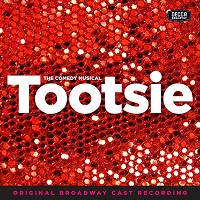 Original Broadway Cast, 2019 (Decca Broadway)
Original Broadway Cast, 2019 (Decca Broadway)  (3 / 5) Librettist Robert Horn and composer/lyricist David Yazbek made some wise moves in translating the popular 1982 comedy film Tootsie into a stage musical — for example, shifting the milieu from a soap opera to a present-day Broadway musical in trouble. The focus remains on Michael Dorsey (Santino Fontana), a jerk of an actor whose desperation leads him to impersonate a woman (“Dorothy Michaels”) to land a role. Michael’s frustrations and hopes are echoed by his better-behaved show biz colleagues, as Yazbek’s brash and brassy score reveals the vicissitudes of the actor’s life. The ensemble expresses joy in “I Like What She’s Doing” when their show starts to improve in rehearsals, and opening night nerves in “The Most Important Night.” Julie Nichols (Lilli Cooper), the actress cast opposite Dorothy in the musical, Juliet’s Nurse, relates the toll that acting takes on personal relationships in the poignant “There Was John.” Sandy (Sarah Stiles), Michael’s neurotic ex-girlfriend, unloads her audition anxieties (“What kind of masochist keeps coming back for more?”) in the rapid-fire mambo number “What’s Gonna Happen.” The song is not quite a match for “Model Behavior” in Yazbek’s Women On The Verge Of a Nervous Breakdown, but it’s easily the funniest number in the score. During all of this, Michael’s roommate Jeff (Andy Grotelueschen) acts as a fresh, raunchy facet of Michael’s conscience. Fontana’s dual roles come alive through his vocal skills, and he nails Michael’s progression. At first, he’s an annoying narcissist making terrible choices, cleverly conveyed in “Opening Number” and “Whaddya Do.” Next, he’s an “Unstoppable” stage success as Dorothy, starting with the diegetic anthem “I Won’t Let You Down.” This serves as Dorothy’s killer audition — Fontana builds and builds triumphantly — and also hints at how “she” will help the show within the show. While the songs reflect Michael’s growth, they’re less successful at showing how Dorothy affects those around her. This isn’t Yazbek’s strongest score, but it serves the comedy of the plot very well. — Laura Frankos
(3 / 5) Librettist Robert Horn and composer/lyricist David Yazbek made some wise moves in translating the popular 1982 comedy film Tootsie into a stage musical — for example, shifting the milieu from a soap opera to a present-day Broadway musical in trouble. The focus remains on Michael Dorsey (Santino Fontana), a jerk of an actor whose desperation leads him to impersonate a woman (“Dorothy Michaels”) to land a role. Michael’s frustrations and hopes are echoed by his better-behaved show biz colleagues, as Yazbek’s brash and brassy score reveals the vicissitudes of the actor’s life. The ensemble expresses joy in “I Like What She’s Doing” when their show starts to improve in rehearsals, and opening night nerves in “The Most Important Night.” Julie Nichols (Lilli Cooper), the actress cast opposite Dorothy in the musical, Juliet’s Nurse, relates the toll that acting takes on personal relationships in the poignant “There Was John.” Sandy (Sarah Stiles), Michael’s neurotic ex-girlfriend, unloads her audition anxieties (“What kind of masochist keeps coming back for more?”) in the rapid-fire mambo number “What’s Gonna Happen.” The song is not quite a match for “Model Behavior” in Yazbek’s Women On The Verge Of a Nervous Breakdown, but it’s easily the funniest number in the score. During all of this, Michael’s roommate Jeff (Andy Grotelueschen) acts as a fresh, raunchy facet of Michael’s conscience. Fontana’s dual roles come alive through his vocal skills, and he nails Michael’s progression. At first, he’s an annoying narcissist making terrible choices, cleverly conveyed in “Opening Number” and “Whaddya Do.” Next, he’s an “Unstoppable” stage success as Dorothy, starting with the diegetic anthem “I Won’t Let You Down.” This serves as Dorothy’s killer audition — Fontana builds and builds triumphantly — and also hints at how “she” will help the show within the show. While the songs reflect Michael’s growth, they’re less successful at showing how Dorothy affects those around her. This isn’t Yazbek’s strongest score, but it serves the comedy of the plot very well. — Laura Frankos
Desperate Measures
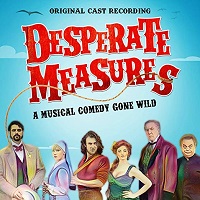 Original Off-Broadway Cast, 2018 (Masterworks Broadway)
Original Off-Broadway Cast, 2018 (Masterworks Broadway)  (3 / 5) People have adapted Shakespeare’s plays into musicals before, usually taking on the Bard’s hits. Librettist/lyricist Peter Kellogg and composer David Friedman chose one of the “problem plays,” Measure for Measure — a complicated stew of morality, corruption, and justice, with not much comedy in it. Kellogg and Friedman dropped their characters in Old West Arizona, and ramped up the sex (keeping the famous “bed trick”) and fun. The result, Desperate Measures, is a raucous, bawdy, old-fashioned musical comedy. The album can’t supply the sight gags, but the performers have great comedic chops, and they land every punch line in Kellogg’s lyrics. Friedman has called his score “Jewish country,” but it’s charmingly varied despite the dominant Western twang. “It Doesn’t Hurt To Try” is a hoedown with banjo and fiddle; “Someday They Will Thank Me” is a comic patter number for the villain, the sleazy governor (Nick Wyman, with a outrageous German accent); and the first act finale, “In the Dark,” is a complex choral piece set to a rhumba rhythm. The scene-setting opener, “The Ballad of Johnny Blood,” is an over-the-top homage to the themes of classic Western TV shows and films like Rawhide and The Good, The Bad, and the Ugly. Broadway influences are present, too, including small nods to Oklahoma! and a big one to Annie Get Your Gun with the best comic challenge duet since “Anything You Can Do”: In “Just For You,” Johnny (Conor Ryan) and saloon girl Bella (the uproarious Lauren Molina) argue over how far each would go in the name of love. (“I slept with another guy, just for you.” “Shot a man and watched him die, just for you.”) Molina also shines in her saloon striptease, “It’s Getting Hot In Here,” and in the duet “The Way That You Feel,” as novice nun Susanna (Emma Degerstedt, with a lovely soprano) instructs her how to be less risqué for the bed trick. Overall, this is a spirited score with heart. — Laura Frankos
(3 / 5) People have adapted Shakespeare’s plays into musicals before, usually taking on the Bard’s hits. Librettist/lyricist Peter Kellogg and composer David Friedman chose one of the “problem plays,” Measure for Measure — a complicated stew of morality, corruption, and justice, with not much comedy in it. Kellogg and Friedman dropped their characters in Old West Arizona, and ramped up the sex (keeping the famous “bed trick”) and fun. The result, Desperate Measures, is a raucous, bawdy, old-fashioned musical comedy. The album can’t supply the sight gags, but the performers have great comedic chops, and they land every punch line in Kellogg’s lyrics. Friedman has called his score “Jewish country,” but it’s charmingly varied despite the dominant Western twang. “It Doesn’t Hurt To Try” is a hoedown with banjo and fiddle; “Someday They Will Thank Me” is a comic patter number for the villain, the sleazy governor (Nick Wyman, with a outrageous German accent); and the first act finale, “In the Dark,” is a complex choral piece set to a rhumba rhythm. The scene-setting opener, “The Ballad of Johnny Blood,” is an over-the-top homage to the themes of classic Western TV shows and films like Rawhide and The Good, The Bad, and the Ugly. Broadway influences are present, too, including small nods to Oklahoma! and a big one to Annie Get Your Gun with the best comic challenge duet since “Anything You Can Do”: In “Just For You,” Johnny (Conor Ryan) and saloon girl Bella (the uproarious Lauren Molina) argue over how far each would go in the name of love. (“I slept with another guy, just for you.” “Shot a man and watched him die, just for you.”) Molina also shines in her saloon striptease, “It’s Getting Hot In Here,” and in the duet “The Way That You Feel,” as novice nun Susanna (Emma Degerstedt, with a lovely soprano) instructs her how to be less risqué for the bed trick. Overall, this is a spirited score with heart. — Laura Frankos
Beetlejuice
 Original Broadway Cast, 2019 (Ghostlight)
Original Broadway Cast, 2019 (Ghostlight)  (4 / 5) How far will a musical go to give you a good time? In the case of Beetlejuice, all the way to the Netherworld and back. Based on Tim Burton’s cult ’80s classic movie of the same title, the show centers around its title character, a fast-talking and wisecracking demon who helps a recently deceased couple try and scare away the family that’s recently moved into their home (though he has his own agenda for doing so). While Burton’s film famously delivered its morbidity with a wry sense of humor that earned it a PG rating, the musical adaptation takes a much zanier, PG-13/R approach. Eddie Perfect’s score has some classic Broadway flourishes sprinkled throughout, but it mostly leans to ’80s-style pop and musical theater faux-rock, which Kris Kukul elevates with his rollicking arrangements and orchestrations. Perfect’s lyrics are also reasonably well crafted, walking the line between wit and crassness. As Beetlejuice, the endlessly energetic Alex Brightman heavily indulges in vocal fry (as a respectful nod to Michael Keaton’s performance in the film) and devours songs like “The Whole ‘Being Dead’ Thing” and “Say My Name” to enjoyable effect. Kerry Butler and Rob McClure are also terrific as the recently deceased couple, Barbara and Adam. They embrace their characters’ intentional blandness in “Ready, Set, Not Yet” without being bland themselves, giving Brightman even more comedic fodder to play with in all of their tracks together. Leslie Kritzer is delightfully wacky as Delia; her “No Reason” duet with Sophia Ann Caruso’s Lydia has some of Perfect’s best lyrics, and is a major highlight of the recording. As the death-obsessed Lydia, Caruso displays a thrillingly unique voice that’s put to good use in her solos “Dead Mom” and “Home.” Enjoyable as the album is, there’s one gripe: Because the score is so eager to entertain, most of the extremely lively songs are packed back to back against each other, and are given no room to breathe. This makes for a rather overwhelming listening experience, with some numbers offering diminishing returns (“Creepy Old Guy” and “That Beautiful Sound” for example). The album may also repel listeners who wanted a more direct replica of the movie, or who prefer their musical comedy without references to cocaine and “ghost zombie Jesus.” But those who are willing to accept Beetlejuice on its own terms are in for a highly entertaining listen. — Matt Koplik
(4 / 5) How far will a musical go to give you a good time? In the case of Beetlejuice, all the way to the Netherworld and back. Based on Tim Burton’s cult ’80s classic movie of the same title, the show centers around its title character, a fast-talking and wisecracking demon who helps a recently deceased couple try and scare away the family that’s recently moved into their home (though he has his own agenda for doing so). While Burton’s film famously delivered its morbidity with a wry sense of humor that earned it a PG rating, the musical adaptation takes a much zanier, PG-13/R approach. Eddie Perfect’s score has some classic Broadway flourishes sprinkled throughout, but it mostly leans to ’80s-style pop and musical theater faux-rock, which Kris Kukul elevates with his rollicking arrangements and orchestrations. Perfect’s lyrics are also reasonably well crafted, walking the line between wit and crassness. As Beetlejuice, the endlessly energetic Alex Brightman heavily indulges in vocal fry (as a respectful nod to Michael Keaton’s performance in the film) and devours songs like “The Whole ‘Being Dead’ Thing” and “Say My Name” to enjoyable effect. Kerry Butler and Rob McClure are also terrific as the recently deceased couple, Barbara and Adam. They embrace their characters’ intentional blandness in “Ready, Set, Not Yet” without being bland themselves, giving Brightman even more comedic fodder to play with in all of their tracks together. Leslie Kritzer is delightfully wacky as Delia; her “No Reason” duet with Sophia Ann Caruso’s Lydia has some of Perfect’s best lyrics, and is a major highlight of the recording. As the death-obsessed Lydia, Caruso displays a thrillingly unique voice that’s put to good use in her solos “Dead Mom” and “Home.” Enjoyable as the album is, there’s one gripe: Because the score is so eager to entertain, most of the extremely lively songs are packed back to back against each other, and are given no room to breathe. This makes for a rather overwhelming listening experience, with some numbers offering diminishing returns (“Creepy Old Guy” and “That Beautiful Sound” for example). The album may also repel listeners who wanted a more direct replica of the movie, or who prefer their musical comedy without references to cocaine and “ghost zombie Jesus.” But those who are willing to accept Beetlejuice on its own terms are in for a highly entertaining listen. — Matt Koplik

